How BIPOC queer activists are using artivism as resistance
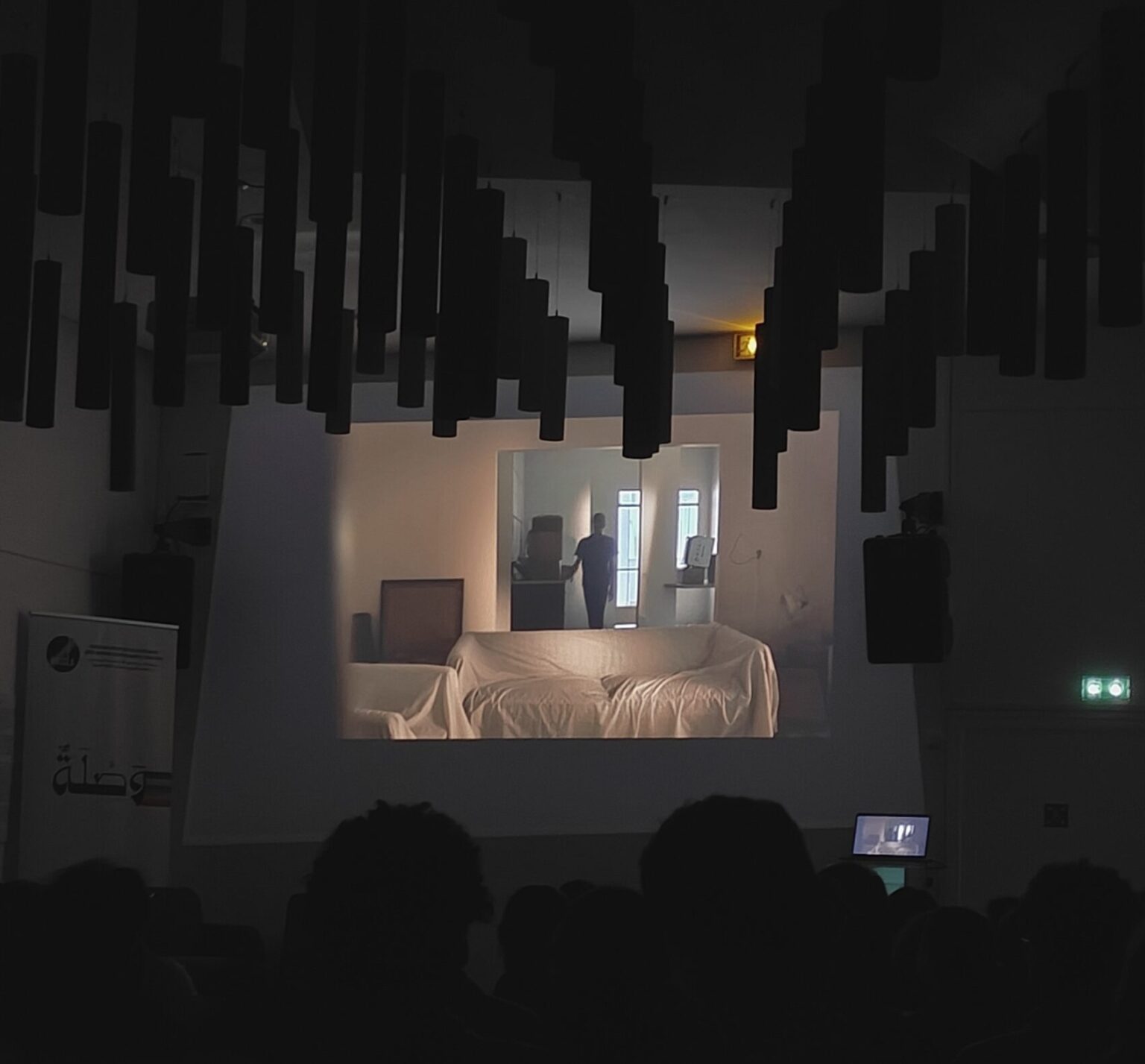
Art has always been a powerful tool of resistance, allowing the oppressed to share their truths and experiences. For many Black, Indigenous, or People of Colour (BIPOC1) LGBTI activists, it is more than expression—it’s a survival tool, a way to build community, a political statement, and a means to reclaim joy.
With this new blog series, we’re sharing insights from the work of LGBTI organisations tackling injustice, racism, and the unique challenges faced by racialised LGBTI communities in Europe. We hope their stories and practices will inspire and resonate. We believe that solutions and approaches that include a few will pave the way and point to the solutions for many. You can read the previous blog in the series here.
Across Europe, LGBTI collectives are harnessing film, music, poetry, and performance to tell their stories, connect with others, and challenge dominant narratives. In today’s blog, we explore how four different racialised queer groups use art in their activism.
Wassla Ciné Queer: Film as a lifeline
For Wassla, a queer cultural organisation based in Paris that works with migrants, film is more than entertainment – it is a lifeline. Their initiative, Ciné Queer, curates short and feature-length movies directed by Arab filmmakers that explore LGBTQIA+ experiences in Arabic-speaking communities. More than just screenings, these events spark critical conversations. Often followed by discussions with directors, the gatherings create a space where people can process what they see on screen, debate social issues, and reflect on their own realities.
At Wassla, there is no distinction between volunteers and participants; everyone plays a role in shaping the community. Many of their screenings feature works by their own members, amplifying voices that might otherwise remain unheard. With audiences sometimes reaching 80 people or more, Ciné Queer combats isolation and fosters solidarity in a safe and empowering space. For Wassla, film is not just about representation, it is about connection, healing, and breaking the silence.
Sadiqa and LIMBO queer exilic narratives: Music as a battle cry
“I am a reality, not an illusion.” These words, from Sadiqa’s song The Voice of the Queer, embody the defiant spirit of many BIPOC queer artists who refuse to be erased. Sadiqa was part of Art for Change, an initiative that examined art as a tool for solidarity and engaged scholarship. During the COVID-19 pandemic, Art for Change brought together queer refugee artists, offering a space to create and share music, poetry, film, and design.
That work continues through LIMBO queer exilic narratives, a platform for queer refugees in the Netherlands to tell their stories through art, to challenge the laws and structures that criminalise their existence, and to carve out spaces of belonging. Sadiqa’s music does not ask for permission; it demands recognition. Their lyrics are a protest against laws such as Article 489 of the moroccan law, which criminalises the sexuality of queer people, and a call out to all systems of oppression that seek to control and suppress marginalised communities:
“The voice of the queer is everywhere, calling against oppression… now we are all aware of the system’s malfunctions”
صوت الكوير في كل مكان، ينادي ضد الطغيان… مازال الحق يبان، و كلشي يرجع مزيان
Rainbow Mind UK: Art as radical self-care
For Rainbow Mind UK, creativity is a crucial part of their radical self-care approach. Working with LGBTI people of colour and refugee communities in the UK, they realised that traditional self-care practices often required participants to re-live painful experiences. Instead, they turned to art and music as a means of engagement, connection, and healing.
One of their most popular practices is the Queer Pencil Disco, where participants use drawing as a form of self-expression, and another involves recalling empowering song lyrics when words are hard to find. For a group of LGBTQ+ refugees, ‘Flowers’ by Miley Cyrus became an anthem of resilience. These practices offer creative expression and make self-care accessible and joyful. Rainbow Mind UK uses art to help people take control of their stories without re-experiencing trauma.
Break Isolation Group: Slam poetry as protest
For Break Isolation Group, spoken word and slam poetry are forms of protest, catharsis, and survival. Many members are queer racialised asylum seekers and refugees who face state repression, deportation threats, and systemic silencing in Germany.
Ann and Rose from Break Isolation Group explain that poetry provides them with a platform to express anger, tell their stories, and build community when traditional political spaces are closed to them.
“We are not able to speak openly in many spaces anymore,” Ann explains. “So now, we turn to slam poetry. Art allows us to purge, to bring experiences to life in a way that just talking about them doesn’t.”
For Break Isolation Group, redefining what counts as ‘art’ is part of their activism. Rose points out that in many BIPOC cultures, storytelling has always been woven into song and dance, but Western frameworks often fail to recognise these as legitimate art forms. “Our ancestors sent messages through music; this is nothing new.” Through their work, Break Isolation Group challenges Eurocentric definitions of art and reclaims creative expression on their own terms.
New funding
ILGA-Europe continues its commitment to providing funds and support for this part of LGBTI movement that addresses intersectional impacts of injustice, racialisation, racism and supremacy. On 30 January 2025, we launched a new call for proposals to support European groups working for and with racialised LGBTI communities. This is the third cycle of this programme. Apply by 30 March 2025, 23.59 CET.
- BIPOC is one of many abbreviations that our partner organisations use to self-identify the racialised communities they belong to. We use it here while acknowledging that there are other terms that might be more apt in different contexts by various groups, such as BAME (Black, Asian, and minority ethnic), BAPOC (Black, Asian and People of Colour), LGBTQI+ individuals of African descent, Arab queers from SWANA region (Southwest Asian and North African region) to name a few that are used by organisations we work with. ↩︎
Call for project proposals: Working with racialised LGBTI communities towards justice (2025-2026)
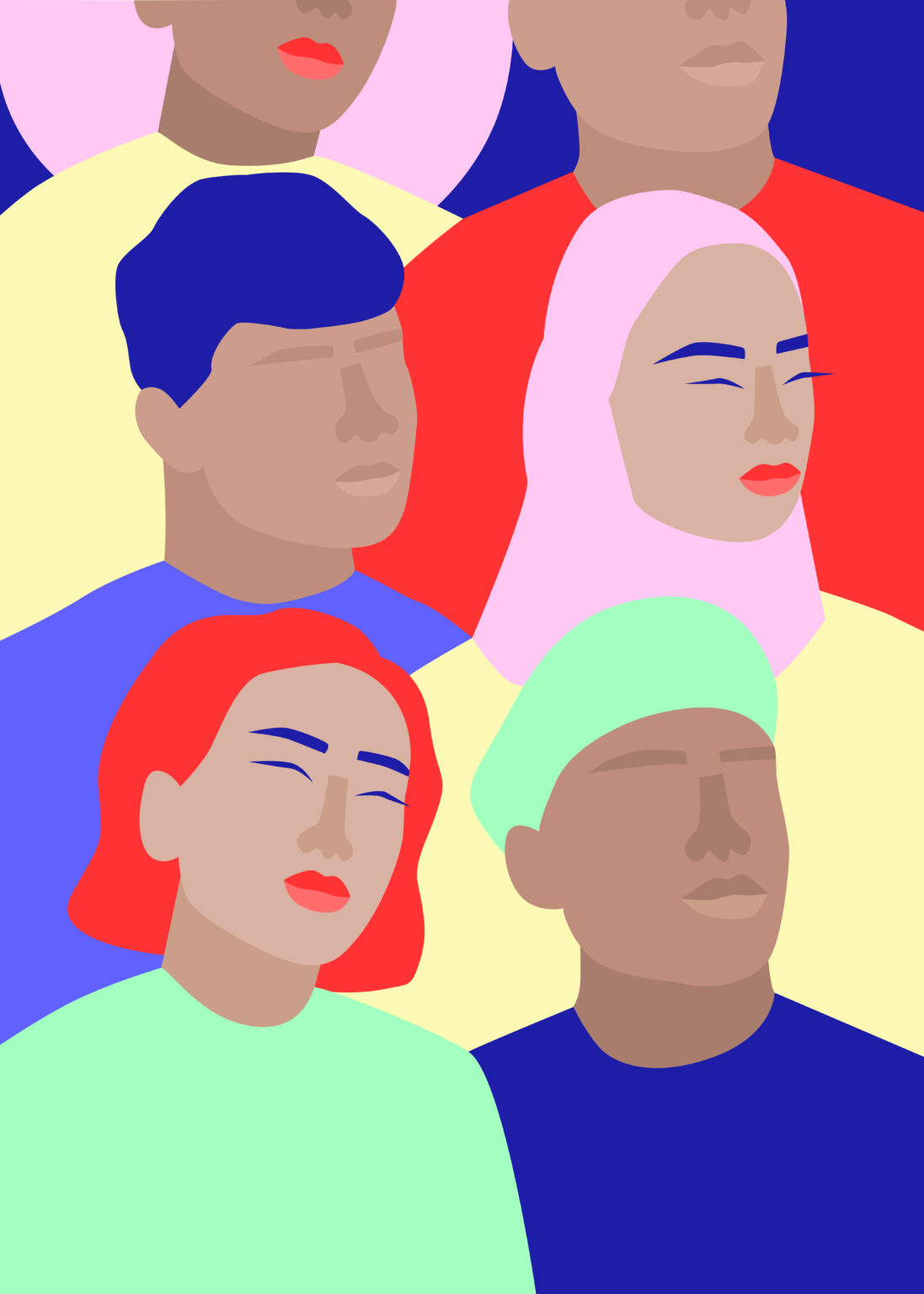
Why we launch this call
In 2023, ILGA-Europe launched a new programme focused on work done by and for racialised LGBTI communities. In 2024, we had the second iteration of this programme. With this third cycle in 2025, ILGA-Europe continues its commitment to providing funds and support for this part of LGBTI movement that addresses intersectional impacts of injustice, racialisation, racism and supremacy, and specific harms affecting the lives of racialised LGBTI communities across Europe.
Many LGBTI organisations and groups run by racialised LGBTI activists continue to face obstacles in accessing funding while they take on the burden of exposing structural oppressions, building and sustaining the resilience of racialised communities, and filling the gaps in provision of services, care and spaces for racialised LGBTI people.
ILGA-Europe recognises the effort and knowledge it takes to address intersectionality. We acknowledge a great value for the wider movement in making the work of racialised LGBTI activists more visible and better supported. This call aims to strengthen organisations run by racialised LGBTI activists and deepen solidarity with racialised LGBTI communities. We see an opportunity to share the learning from this programme to the wider movement, as we believe that solutions and approaches that include a few will pave the way and point to the solutions for many.
Aim of the program
The aim of this program is to address the intersectional impact of injustice, racialisation, racism and specific harms affecting the lives of racialised LGBTI communities across Europe.
This program will do it by:
- Supporting, strengthening and advancing the work of up to 13 European LGBTI organisations that are led by racialised LGBTI people and work with and for racialised LGBTI communities;
- Creating spaces for the organisations to exchange and build connections through holding regular partner meetings
Structure of the program
Participation in the program involves TWO components:
- Financial support of a project (up to €25,000 per project for 12 months), AND
- Regular partner meetings that will bring groups together (on-line) to strategise and share work and experiences (three meetings in 12 months).
Available funding
- We can support up to 13 organisations with grants in the amount of €20,000 to €25,000: up to 11 grants to the EU-based organisations and up to two grants to non-EU based organisations.
- The project has to run for 12 months: from 1 June 2025 until 1 June 2026.
Type of organisations and groups we will support
This call is aimed specifically for registered and non-registered[1] LGBTI organisations and initiative groups in Europe that are:
- Led by racialised LGBTI people and
- Working for and with racialised LGBTI communities[2].
Due to our donor’s limitations, we are only able to support organisations that are:
- Member organisations of ILGA-Europe as of 1 June 2025 (start of the project). If your application for membership is under consideration as of 30 March 2025 (the deadline for this application), you are eligible to apply[3].
Type of projects we are looking to support
We are looking for projects whose primary aim is to address the intersectional impact of injustice, racialisation, racism and specific harms affecting the lives of racialised LGBTI communities across Europe.
We will support projects that offer to do this through one (or several) of the following ways of working:
- Facilitating fairer/better access of racialised LGBTI communities to opportunities, services, spaces and care from which these communities have been historically excluded;
- Forging and advancing collaboration and partnerships with other actors: activist groups (racialised or not; LGBTI or beyond), media, authorities and/or service providers;
- Exploring, reclaiming and enhancing voices and experiences from racialised LGBTI communities to challenge existing structures, change existing practices, mobilise wider support, and engage the community;
- Strengthening internal organisational structures, skills and practices to build a sustainable presence for and with(in) the communities and wider civic society space.
Budget criteria
Budgets up to €25,000 per 12 months of the project are eligible. Only costs between 1 June 2025 to 1 June 2026 can be included in the budget[4]. The types of costs covered by this programme are direct project costs and can include:
- Personnel costs
- Travel and event costs (both physical and digital)
- Costs related to obtaining external expertise and/or services associated with the implementation of the project
- Interpretation and translation costs
- Communication activities and campaigns related to the aim of this call, including social media and traditional media fees, production of materials, design, printing
- A fair proportion of administrative costs or core organisational costs which are linked to the implementation of the project (rent, utilities, IT, technology, telecommunications, accounting, administrative fees, fiscal sponsor fees, depreciation of new and existing equipment).
Under this call, there is NO budget percentage limitation to cover personnel and consultancy costs, as long as they are directed towards the objective of the call. This means that you can include as many human resources or external personnel costs as needed, and these costs might represent an important share of your budget.
Organisational capacity building can be included. This means projects can incorporate training, internal learning for staff and/or volunteers and other activities aimed at building the knowledge and skills needed for organisations to meet the broader purpose of this call.
Time commitment
We are aware that many LGBTI organisations run by racialised LGBTI people operate on voluntary bases, with limited human, financial and time resources. Therefore, we want to communicate in advance the time commitment needed for this programme apart from implementing the project. This is the time needed to connect to other organisations within the programme, communicate with ILGA-Europe, and report back.
Participation in the programme comes with the following commitments:
- What: Three on-line meetings for programme partners to come together, share space and experiences, learn about each other’s work, build connections
When: July 2025 (kick-off), February 2026 (mid-way), and June 2026 (closing)
Time: 1h 30 mins each meeting
- What: Four progress calls with ILGA-Europe to discuss an ongoing work, implementation of the project, needs, challenges, opportunities
When: June and September 2025, January and April 2026
Time: 1h each call
- What: Interim financial report
When: 4 November 2025
Time: As required depending on your capacities and needed support from us
- What: Final financial and narrative reports[5]
When: mid-June 2026.
Time: As required depending on your capacities and needed support from us
We will schedule meetings in advance and in conversation with you.
ILGA-Europe staff that will work with you
In this programme you will be closely working with two ILGA-Europe colleagues: Nadzeya Husakouskaya and Antonella Cariello.
As a Programmes Officer, Nadzeya is the main contact between you and ILGA-Europe. They hold key elements of the programme – communication with partner organisations, organisation of connecting spaces, structure and design of the program, learnings for ILGA-Europe and the wider movement.
As a Finance and Grant Officer, Antonella oversees and supports financial aspects of the project implementation. She handles any grant management, budget and finance-related questions.
You can read more about both colleagues here.
Key Things to Consider
In selecting proposals, ILGA-Europe will prioritise projects that respond to the framework, aim, objectives, and areas of work of this call, and:
- Clearly communicate how injustice, racialisation, and racism are impacting racialised LGBTI communities in the local contexts (Questions 2.1, 4.1 and 4.2 in Application form)
- Present a well thought-through plan for how the work will be carried out and how it will contribute to positive outcomes for racialised LGBTI communities in the context and the obstacles (practical, political etc) you may face (Section 4 in Application Form and the Budget)
- Have strong ties to the local racialised LGBTI communities and connections to local LGBTI movement (or some parts of it) (Section 2 in Application Form)
- Work towards bridging gaps: in services, within and amongst the communities, with other groups and actors (Questions 4.1, 4.2, 4.3 and 5.1 in Application form)
- Strive to establish connections, collaborations, practices and tools that can live beyond the project’s lifetime (Questions 4.2, 4.3, and 5.1 in Application Form)
- Have a minimal financial capacity and some financial management system in place to implement the project (Section 3 in Application form and the Budget)
Do you have any questions?
- You can read Q&A document in the application package. It covers many questions that we received over the previous two iterations of the programme. It is useful to look through it! The Q&A document will be updated on 21 February and 21 March after on-line Q&A sessions.
- You can come to one of the online Q&A sessions we will hold – on 19 February, Wednesday, 12.00-13.00 CET (register) and 20 March, Thursday, 17.00-18.00 CET (register). The questions and answers from these sessions will be included into an updated version of Q&A document.
- While working on the budget, you can look at the example of the pre-filled budget we provided in the application package. It illustrates the information that needs to be included in the budget and formats in which to provide it to make financial aspects of the project clear.
- You can e-mail nadzeya@ilga-europe.org and get an answer via e-mail. All answers to the questions received via e-mail will make it to the updated Q&A document as well.
Application
- Proposals should be submitted using the application form and budget template to nadzeya@ilga-europe.org. The last day to submit your application (deadline) is 30 March 2025, Sunday, 23:59 CEST.
- We will inform all applicants about the outcomes of the selection process via the e-mail provided in the application by 1 May 2025 at the latest.
- Contracts will be signed with successful applicants by end of May 2025. Successful applicants should be available to respond to requests during May 2025.
- The timeline for all projects supported in this programme is fixed: Projects are to start on 1 June 2025 and end on 1 June 2026.
Advance planning information for successful applicants:
- Partner meetings will be scheduled for July 2025 (kick-off meeting) and February 2026 (mid-way meeting) as soon as the cohort of partner organisations is selected. The closing on-line meeting will happen in June 2026 and will be scheduled at the beginning of 2026.
- Progress calls with ILGA-Europe will be scheduled on a rolling basis.
- A financial interim report will be due on4 November 2025 and the final financial and narrative reports in mid-June 2026.
[1] Non-registered organisations and groups are eligible to apply, but must partner with a registered legal entity that is able to receive funds from ILGA-Europe. This entity cannot be a physical person.
[2] When we speak about racialised LGBTI communities, we are referring to LGBTI communities whose lives – and life experiences – are shaped and limited by racialised profiling, racist structures, policies, treatment and discrimination. Because intersectional oppressions are rooted in the ‘logic’ of a human hierarchy, with Whiteness and patriarchy as supreme, we know that harms will particularly affect people racialised as Black, as well as Indigenous people, people of colour, racialised minorities in Western and Northern Europe (such as Roma, Kurds, Sami people etc.) and in Central and Eastern Europe (such as Crimean Tatars, people from Central Asia and South Caucasus in Russia etc.
[3] There is more information about membership in the Q&A document in the application package.
[4] You can look at an example of the prefilled budget we provided in the application package. This can give you a clearer idea what information we need from you to include and in what format for us to be able better assess the financial part of the project.
[5] Full information and guidance on reporting financial and administrative requirements will be provided to successful applicants.
Remarkable and resilient Prides across Europe
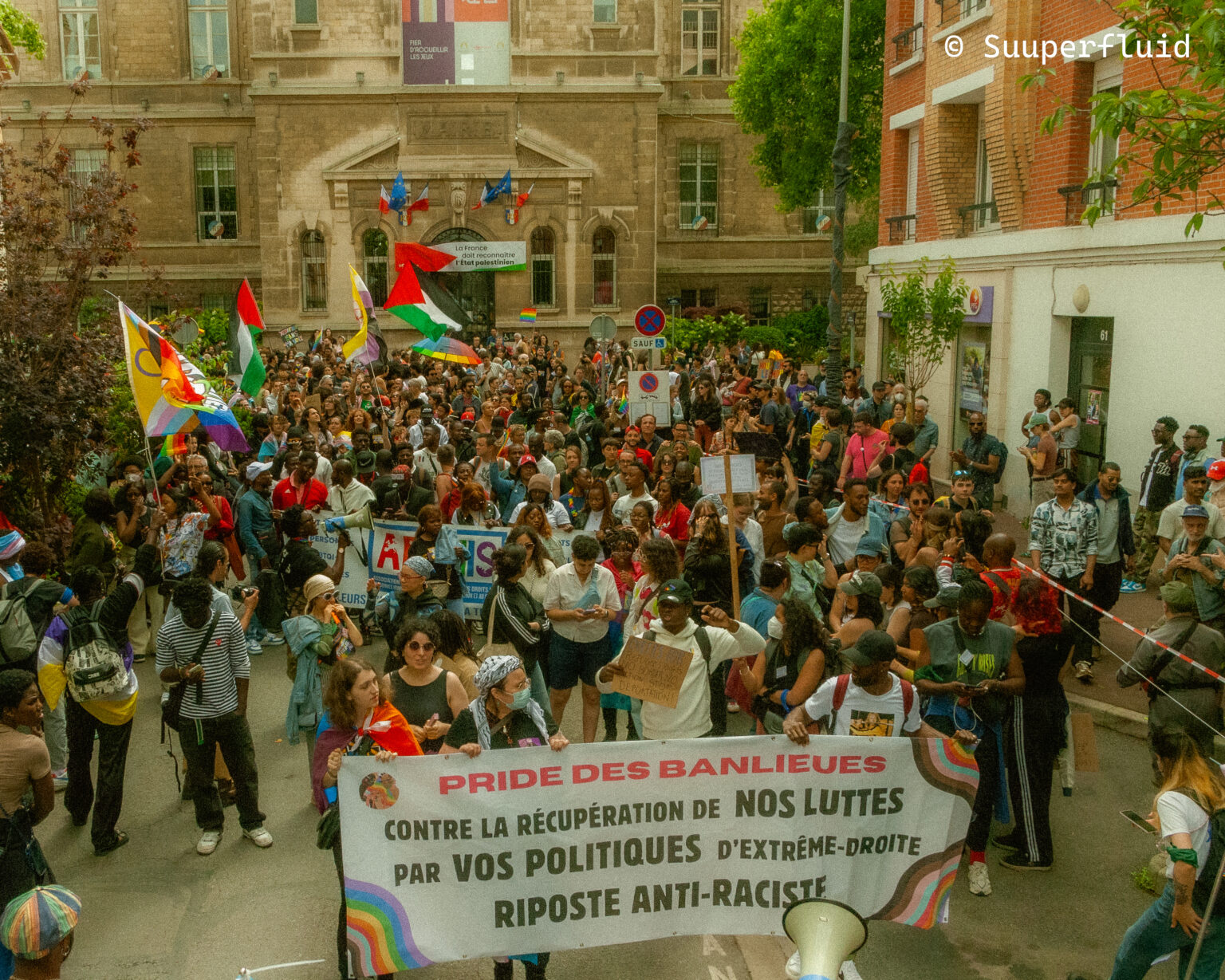
Amid political turmoil, war, social issues and cultural changes, Pride celebrations in Europe continue to demonstrate the resilience and determination of LGBTI communities
Today, on the eve of EuroPride in Thessaloniki, we are highlighting a number of significant Pride events on the continent, and one clear message shines through: LGBTI people are persisting in asserting their right to assemble and freely express themselves, thereby firmly establishing their presence in society. Pride events not only celebrate identity and diversity but also serve as critical platforms for political engagement. They amplify the voices of LGBTI people across Europe, who continue to push boundaries and demand their rightful place in society. Here are just a few of the thousands that have and will happen across Europe this year, in places where challenges are acute.
Kyiv Pride, Ukraine
Kyiv Pride 2024, on June 16, took place amidst challenging circumstances, reflecting the determination of Ukraine’s LGBTI community. Despite facing a cap on participation and heightened security measures, over 500 people marched through the streets of the capital to advocate for partnership recognition and protections against hate crimes. The event occurred against a backdrop of ongoing war, underscoring the urgent need for legislative reforms to safeguard LGBTI rights in Ukraine. Despite tensions and counter-protests, Kyiv Pride 2024 stood as a powerful assertion of the community’s right to freedom of assembly and expression.
“We took only a few steps, we made this painful compromise for the sake of safety and in order to revive the tradition and make a powerful and open Kyiv Pride March next year.” – Anna Sharygina, lead organiser of KyivPride.
La Pride des Banlieues (The Pride of the Suburbs), La Courneuve, France
La Pride des Banlieues happened in La Courneuve on June 22, representing LGBTI people from French working-class areas, many of whom are racialised. The group has been organising the Pride for several years in Saint-Denis. This year, however, the municipalities denied permission to march in Saint-Denis because of preparations for the Olympic Games in the city. Due to a last-minute relocation from its original venue and losing support from a municipality that had previously been an ally of past La Pride des Banlieues marches, the event took place in another suburb of Paris with less resources for security and less time to figure out new support infrastructure.
It was important that La Pride des Banlieues took place this year as the far-right opposition has been gaining more traction in France, getting more intense in their actions against LGBTI communities, with racialised LGBTI communities particularly facing multiple situations of discrimination and harassment. In their political message at La Pride des Banlieues, the organisers and their constituents condemned rising hate speech, discriminatory immigration policies, and institutional racism, aiming to resist far-right co-optation and mobilise solidarity against oppression of ethnic minorities and LGBTI communities in the suburbs.
“The fight against the far-right cannot be reduced to a universal fight, we must recognise the multiple and interconnected realities of oppression.” – La Pride des Banlieues organisers.
Trans Pride Istanbul, Turkey
Trans Pride Istanbul on Sunday June 23 was marked by decentralised actions across the city. Under the theme “Perpetrator State,” participants asserted trans visibility and existence, refusing to be silenced despite bans and oppression. Rather than a centralised march, activists mounted a number of smaller, unannounced activities like hanging trans flags, projecting messages across city landmarks and reading of a statement in front of Pride attendees. The event unfolded amidst stringent security measures, including metro station closures and a heavy police presence. Two people were detained and released after. This year’s Trans Pride Istanbul not only showcased solidarity and determination among Turkey’s trans community but also highlighted ongoing issues of discrimination and the fight for visibility and rights, echoing their message that the state is accountable for perpetuating violence and systemic injustices against trans people.
“We are trans people who are made the targets of violent and discriminatory policies at any chance given just because of our trans identities.” – Trans Pride Istanbul organisers
Looking Ahead
As we approach the end of June, two more significant events lie ahead this weekend.
Bucharest Pride, Romania
More than 25,000 people are expected to take to the streets of Bucharest on Saturday, June 29 to celebrate diversity and claim the rights of the LGBTI community at a crucial moment in Romania. Both presidential and general elections are approaching, and 20% of Romanian MEPs elected to the European Parliament were from the far right, with two of them using anti-LGBTI hate speech. Additionally, a new referendum regarding the definition of families is being pushed by the government opposition.
Pride in Bucharest will address the urgent need for legal recognition and protection of all same-sex families, continuing the push for the immediate implementation of the 2018 Coman case. In the case, the European Court of Justice affirmed residency rights in EU countries (that do not recognise same-sex unions) for the spouse of an EU citizen exercising their right to freedom of movement. Romania has yet to implement the verdict by granting Andrew Coman’s husband a residence permit, and a draft law has been adopted that would stop Romania from implementing it.
ILGA-Europe will be in Bucharest this coming October for their Annual Conference, working with local hosts ACCEPT and MozaiQ, recognizing this as a crucial moment for LGBTI human rights in Romania.
Istanbul Pride, Turkey
Istanbul Pride will take place on Sunday, June 30. Given the government and police response to Pride in the country over the past years, we will be closely monitoring what is happening. One thing we do know is that the LGBTI community in Istanbul and their allies will assert their human right to freedom of assembly and freedom of expression by attending Pride, with pride, resilience and courage. We will be reporting on Istanbul in this year’s instalment of our Turkey Pride monitoring blog over the coming weeks, as we learn from activists and organisers how officials are responding to Prides across the country. You can read our Turkey Pride monitoring blog from 2023 here.
The Frontline: Intersectionality in the LGBTI movement
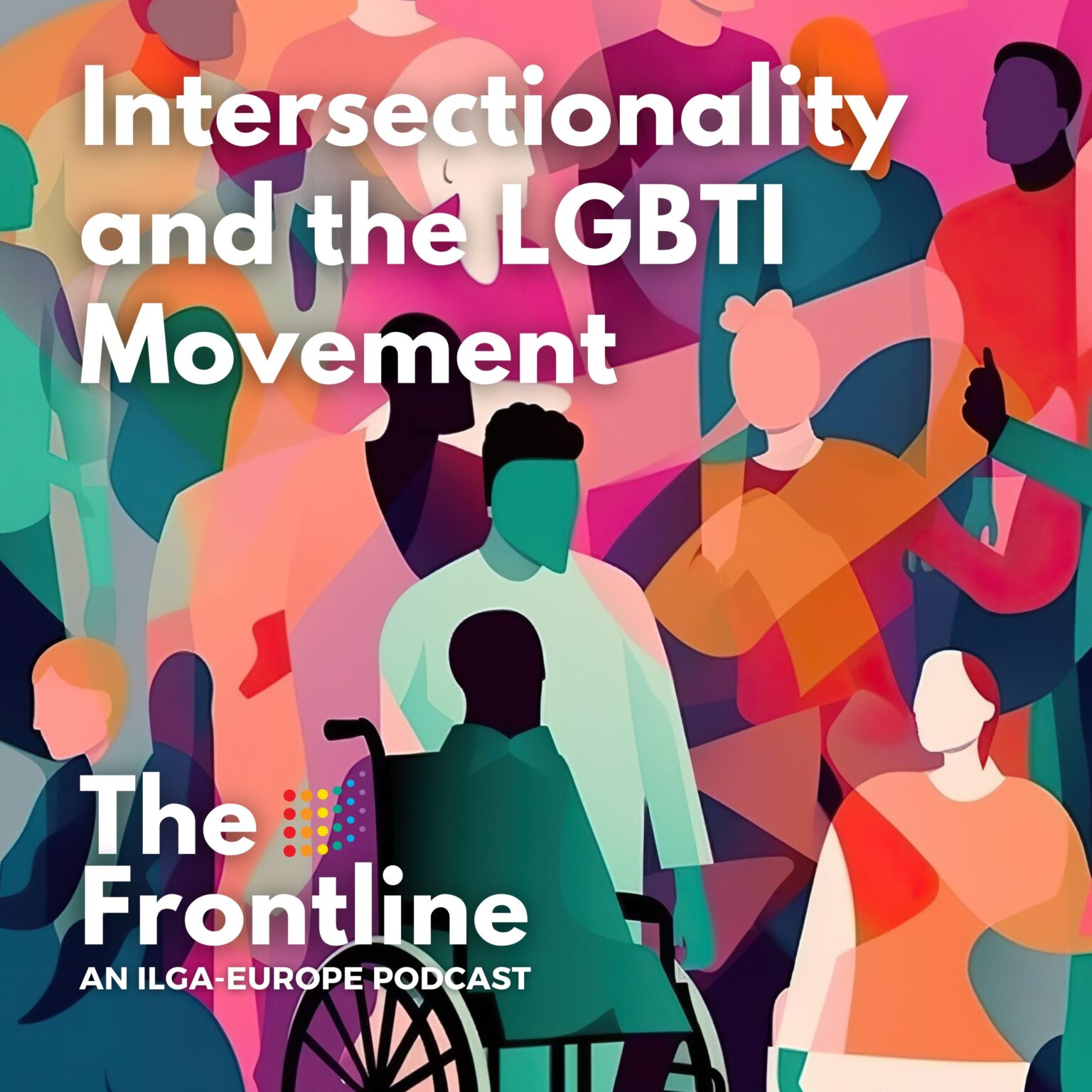
Intersectionality is a buzzword that’s often used, but what is true intersectionality and how do we fold it into the work of the LGBTI activist movement? How do create the change we want to see in society, so that the less privileged within our communities are recognised, valued, included and heard, and where the specific issues that affect those on the intersections are addressed?
But to begin with, what actually is intersectionality? How do we learn about being truly intersectional and practically put it to use? How do we open ourselves to take on board and learn from critique? And how do we learn from the mistakes we often make?
These are some of the questions in this special episode, presented by Valeria Santostefano, a former team member with ILGA-Europe who was active in the intersectionality portfolio, and who has recently joined the team to support internal learning. Valeria is joined by the former Executive Director, Evelyne Paradis, who has been part of the learning for 15 years, and the new Executive Director, Chaber who is taking the work, and the continual learning, forward.
6 ways ILGA-Europe practice intersectionality
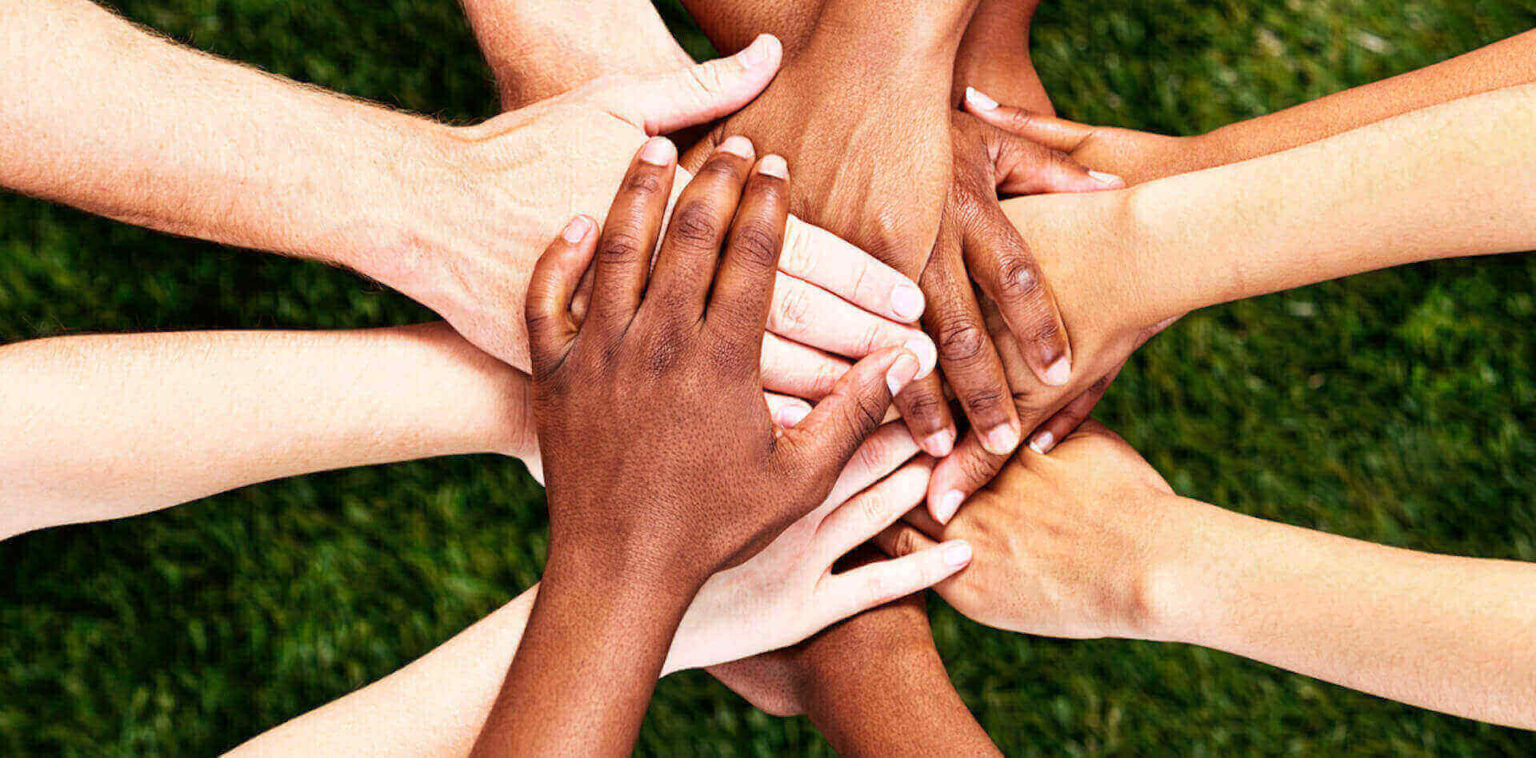
Over the past decade, ILGA-Europe has embarked on a learning journey to become an organisation that genuinely adopts an intersectional approach in all its work. But what does true intersectionality mean, and how can it be integrated into the work of the LGBTI activist movement?
This blog is based on a conversation between former ILGA-Europe team member Valeria Santostefano, former Executive Director Evelyne Paradis, and our new Executive Director Chaber for a special Frontline podcast episode in which they discuss our organisation’s journey over the past two decades towards adopting a more intersectional approach in our work.
Understanding intersectionality
Intersectionality, a concept coined by leading scholar of critical race theory, Professor Kimberlé Crenshaw, is a framework that recognises how various aspects of our identities, experiences, and backgrounds impact our lives, opportunities, and access. It emphasises that people are multifaceted, acknowledging that factors such as race, gender, sexuality, and class intersect to shape unique experiences of discrimination and privilege.
ILGA-Europe’s journey
ILGA-Europe has always recognised the need to include diverse voices and experiences. However, it was only in the mid-2010s that we began to critically question our own structures and practices. According to Evelyne Paradis, who was Executive Director of ILGA-Europe at the time, this shift involved reassessing the organisation’s practices to ensure inclusivity, rather than expecting others to fit into the existing structure.
Six ways ILGA-Europe has grown in practicing intersectionality
1. Recruitment practices
ILGA-Europe made a concerted effort to attract a diverse pool of applicants by re-evaluating our recruitment criteria and processes. We adjusted criteria to be more inclusive, removing barriers such as requiring certain levels of formal education or specific work experiences.
2. Event accessibility
During our annual conference and other events, we have implemented measures to ensure accessibility for all participants. This includes providing materials in multiple languages, ensuring venues are accessible to people with disabilities, and offering travel grants to individuals from underrepresented communities.
3. Advocacy and policy work
ILGA-Europe has broadened its advocacy to include issues that intersect with LGBTI rights, such as socioeconomic inequalities, asylum and refugee rights, and access to healthcare. By working alongside other organisations focused on these areas, we aim to address the multifaceted nature of discrimination and ensure a holistic approach to human rights.
5. Rainbow map recalibration
We recalibrated the Rainbow Map to place less emphasis on marriage equality and more on other critical issues such as legal gender recognition, hate crime legislation, and access to asylum. This shift recognises that while marriage equality is important, other areas require attention to achieve true equality.
6. Changes based on feedback
Chaber, the new Executive Director of ILGA-Europe, emphasises the value of receiving and acting on critical feedback. Detailed feedback that highlights unseen areas and areas needing improvement is crucial for understanding how to better support and represent underrepresented communities.
Building blocks for intersectionality
Building a learning organisation has been a fundamental aspect of our development. This involved dedicating time and resources to reflection and improvement, forming a working group on diversity and incorporating intersectionality into our annual planning. We also emphasise the importance of clear communication about our mission. While we are primarily an LGBTI rights organisation, we adopt an intersectional approach to ensure that our advocacy and support encompass a broad range of issues affecting our community. This includes addressing socioeconomic inequalities, working on issues of asylum and refugees, and engaging in broader human rights advocacy.
Sharing our learning with the wider movement
Recognising the value of not only integrating our learning around intersectionality in the materials we provide to help build the movement, such as publications, toolkits and skills boosts, we have published a number of resources on the ILGA-Europe Hub, which provides free and easy-to access learning cards, including on how to integrate intersectionality in your organisation, in policy and advocacy work, in recruitment processes, and in communications. The Hub intersectionality cards can be found here. If you don’t already have an account on The Hub, it’s a completely free-of-charge resource that’s super easy to join.
Moving forward
Starting small, such as having conversations about intersectionality within teams, can build into more substantial change. ILGA-Europe remains committed to this ongoing process, continually exploring how to make our work more accessible and representative of the diverse LGBTI community.
For a more in-depth discussion on how ILGA-Europe has worked to integrate intersectionality across all our work, listen to our special episode of The Frontline podcast.
Roma and LGBTI: A spotlight on lived experiences
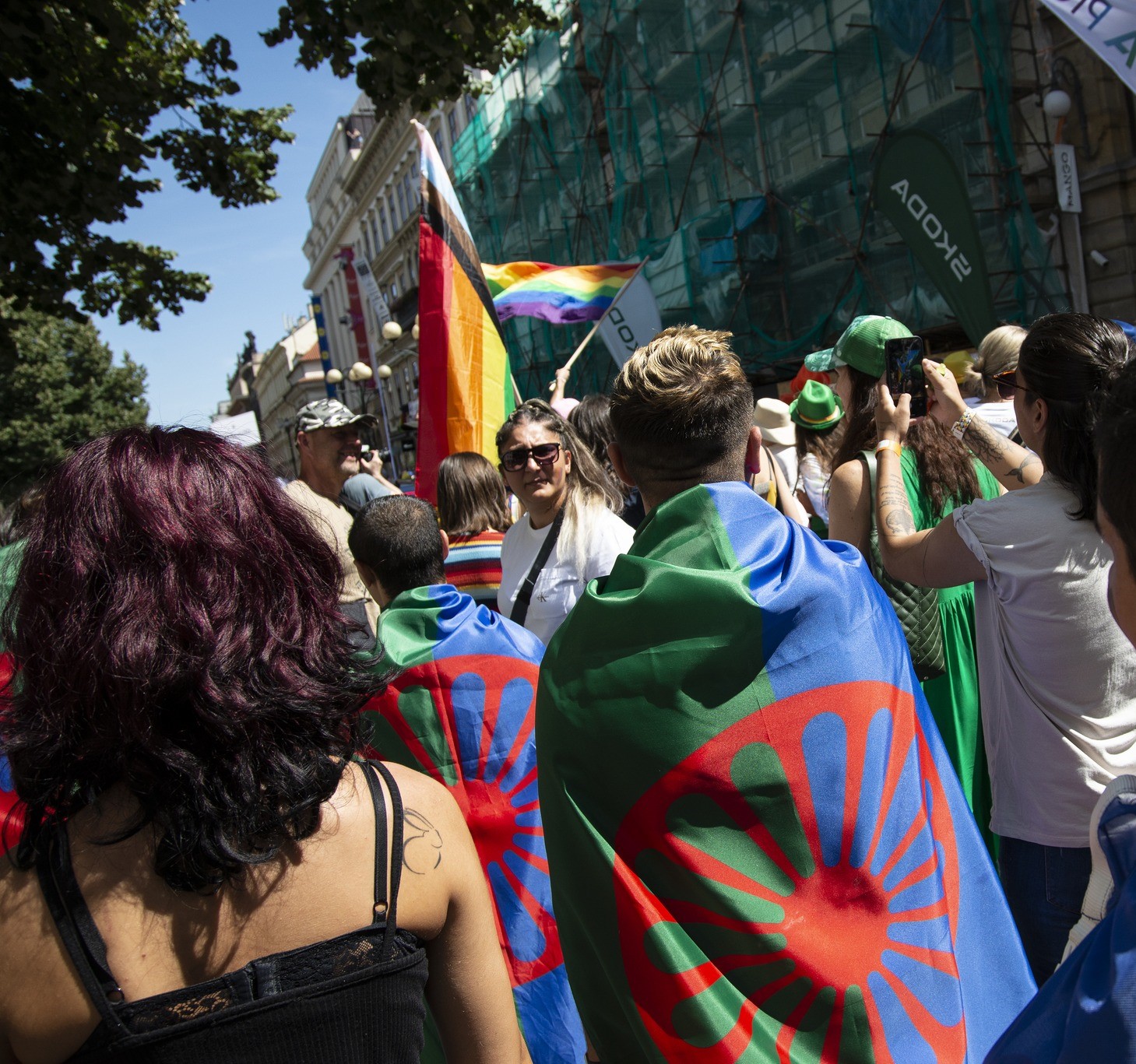
Today, as we mark International Roma Day, we celebrate a diversity of voices within the Roma LGBTI community, revealing the resilience, strength, and beauty of a community that is often silenced and made invisible
For Roma people who identify as LGBTI, their lives come with a unique set challenges and complexities. It is a journey that traverses the intersections of race, ethnicity, gender, sexuality, and culture, navigating landscapes shaped by centuries of marginalisation and discrimination.
Within the Roma community, where traditions run deep and cultural norms are fiercely upheld, the experience of being LGBTI can be particularly fraught, often leading to invisibility, rejection and isolation. Yet, despite these challenges, so many Roma LGBTI people, who can be open about who they are, carve out spaces of belonging.
In this blog, through a selection of resources, we are shining a spotlight on the lived experiences, struggles, and triumphs of Roma LGBTI community, offering insight, understanding, and solidarity.
Stories of LGBTQ+ People of Roma Origin by Ara Art
This collection delves into the real-life experiences of queer Roma individuals. From tales of triumph to stories of struggle, these accounts offer a wonderful and enlightening glimpse into issues of multiple discrimination, but also celebrate the joy of being LGBTQ+ and Roma.
Manifesto “A better place for Roma LGBT+ in social movements”
This manifesto, written by Roma feminists, queers, and allies, exposes the systemic racial inequalities and exclusion experienced by Roma LGBT+ individuals and calls for genuine representation, challenging existing power dynamics, and urging solidarity in combating racism and discrimination within social movements.
The Prague Declaration, published by Ara Art
A document from the First International Roma LGBTIQ Conference underscores the need to address discrimination faced by LGBTI Roma, Gypsy, Sinti, and Travellers across Europe, calling for the establishment of a joint European platform to advocate for their human rights.
Article by Lucie Fremlova about the book “Queer Roma: In-depth Insight into Their Lives”
Discussing the book, Queer Roma: In-depth Insight into Their Lives, published by Routledge, this article highlights the publication’s profound exploration of the complex intersections of anti-gypsyism, homophobia, and transphobia shaping the identities of queer Roma individuals.
Gypsy, Roma and Traveller LGBTQ+ Spoken History Archive by RCAC and ERIAC
This archive made by Romani Cultural & Arts Company (RCAC) and the European Roma Institute for Arts and Culture (ERIAC) presents a diverse collection of interviews, representing intersectional experiences of LGBTQ+ individuals within Gypsy, Roma, and Traveller communities worldwide. Ara Art offers commentary on the work, further emphasising the significance of its narratives and insightful discussions.
Intersectional Inequalities Faced by Romani Queer Women by Ahmad Al-Kurdi
Exploring the challenges confronted by queer Romani women in Eastern and Central Europe, highlighting the interplay between economic deprivation and symbolic injustices within this marginalised group.
Unveiling Inequality Experiences of LGBTI+ Travellers & Roma by Dr. Sarah Sartori
This peer-research initiative from Ireland unveils the experiences of exclusion faced by LGBTI+ Travellers and Roma, and represents the largest study of its kind in the country, engaging 57 participants through online surveys and focus group discussions.
The Roma minority and its status in selected EU countries (CZ, SK AND HU) by Ara Art
This report delves into the situation of LGBTQ+ individuals of Roma origin and presents an analysis spanning the Czech Republic, Slovakia, and Hungary, offering realistic recommendations and reflections on future developments.
Roma LGBTI, Feminist Movement and Scholarship by Dezso˝ Máté
Reflecting on the past 50 years of the international Roma movement, this volume traces the evolution of Roma cultural identity politics and civil rights activism.
We acknowledge that there are many lesser-known yet equally valuable resources on Roma LGBTi lives and experiences created by smaller organisations and communities. We extend an invitation to these groups to share their resources with us, so we can enrich our list even further and ensure a more comprehensive representation of the Roma LGBTI experience.
Future visions: 7 LGBTI groups working for racial justice and equity
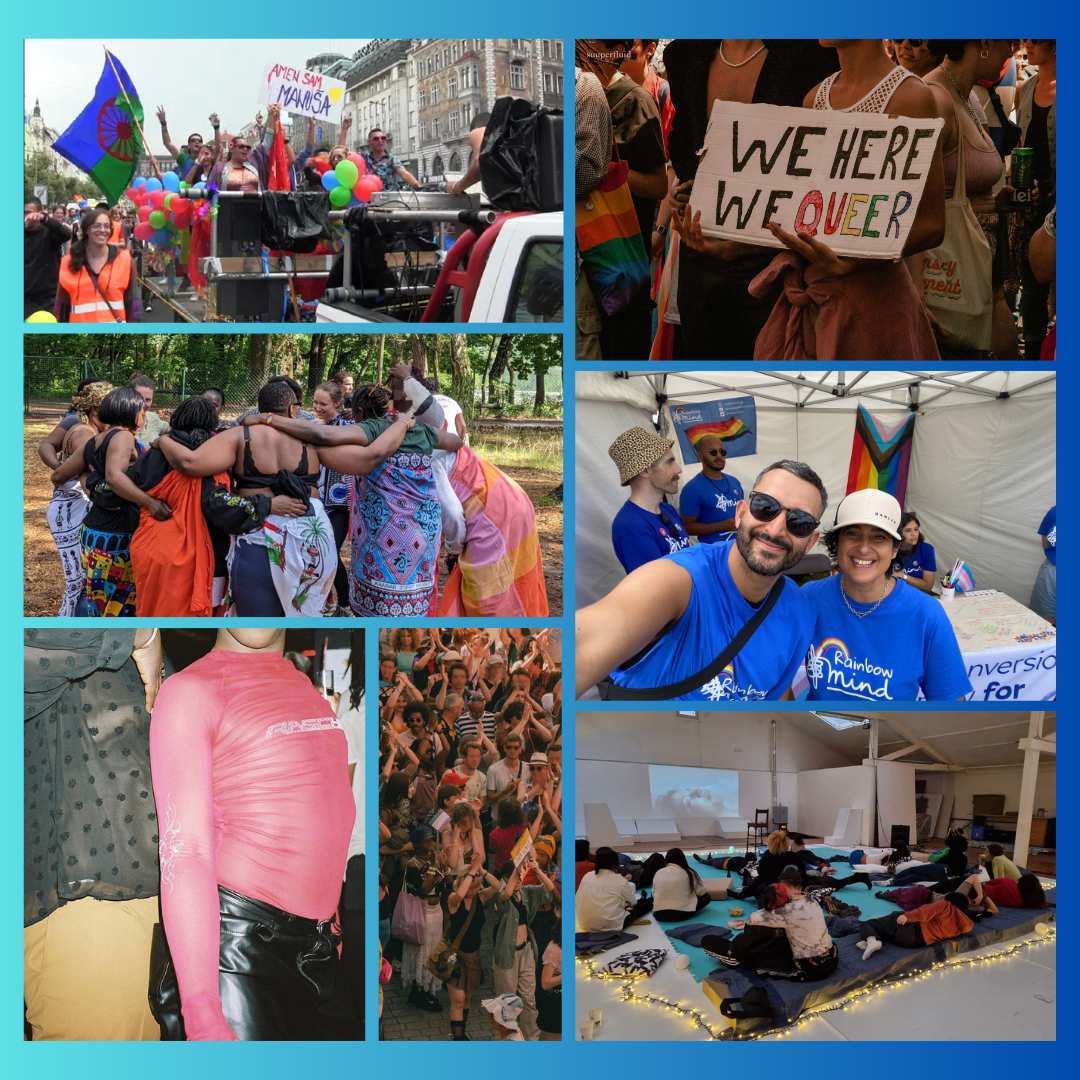
In this blog, marking International Day for the Elimination of Racial Discrimination, seven of our partner organisations share their aspirations, visions, and messages for the wider LGBTI movement
Across Europe and Central Asia, tremendous collective work is needed to undo deeply embedded prejudice, racism, inequities and oppression.
Many groups and collectives, led by and working for racialised LGBTI communities, are putting their knowledge, time, energy and talent to use, day in and day out, in the undoing of prejudice and oppression within our movements and societies.
Here are the visions seven of our partner organisations, run by racialised activists, hold for the movement and the future.
ARA ART – Czechia
“We are working towards future where intersectional equality will be key to everyone feeling respected and supported in their unique identities.”
“In the future LGBTI movement in Europe, it should be a priority to protect and respect particularly vulnerable minorities within the LGBTI movement to ensure that every individual feels safe and supported.”
Break Isolation group/International Women* Space (IWS) – Germany
“We are working towards a future where the freedom of movement, autonomy, emancipation and liberation of racialised queer folk is a right, not a privilege.”
“In the future LGBT movement in Europe, we hope to collaborate, join formidable alliances and create sustainable community care and support systems for racialised LGBT persons in Europe and beyond.”
Fite Qlub – netherlands
“We are working towards a future where people living in the Western world are not subjected to racialisation, homophobia, and transphobia. Our mission is to end systemic oppression, both political and economic, against LGBTQI+ communities that are not conforming with the norms of Western society, and achieve sexual liberation through an intersectional and anti-colonial approach.”
“In the future European LGBTI movement, we need to collaborate with our comrades and allies to create networks of care and solidarity to support each other. The challenges occurring in one country affect others, despite the illegitimate borders drawn by nation-states with a colonial mindset. European policies and institutions often perpetuate the destiny for a white, cis, heteronormative, capitalist system that is an oppressive tool over our communities in Europe.”
Minbar Wien – Austria
“We are working towards a future where people feel more connectedness within the queer community.”
“In this future, the LGBTI movement in Europe will include racialised points of view and needs within the decision-making process and will make a space for cultural diversity within the priorities.”
La Pride des Banlieues – France
“We are working towards future where the most marginalised people will have access to the same rights as everyone.”
“In this future LGBTI movement in Europe, we will strive to make the struggles of racialised and marginalised people more visible and will ensure that they are heard.”
Rainbow Mind – UK
“We are working towards a future where all LGBTQIA people have access to culturally competent mental health services and where all parts of their identity are welcome.”
“For this future LGBTI movement in Europe, we call for mental health support for all LGBTQIA people as a human right. We need a radical approach to health activism to co-produce mental health support tailored by and for racialised LGBTQIA people.”
Rainbow Nation Brussels – Belgium
“We, at Rainbow Nation Brussels, are working towards a future where every Black, brown, and person of colour within the LGBTQIA+ community feels valued, heard, and supported.”
“In this future, let’s commit to deconstructing our biases, unlearning racist behaviours and collectively creating spaces that are truly inclusive, where every member of our community can thrive without fear of marginalisation or injustice.”
ILGA-Europe has the privilege to learn from and work with these groups through our dedicated programme in support of the work done by and for racialised LGBTI communities. We are currently inviting project proposals for the next iteration of this programme, as we continue our commitment to providing funds and support for those in the LGBTI movement who address intersectional impacts of injustice, racialisation, racism and supremacy, affecting the lives of racialised LGBTI communities across Europe.
Call for project proposals working with racialised LGBTI communities
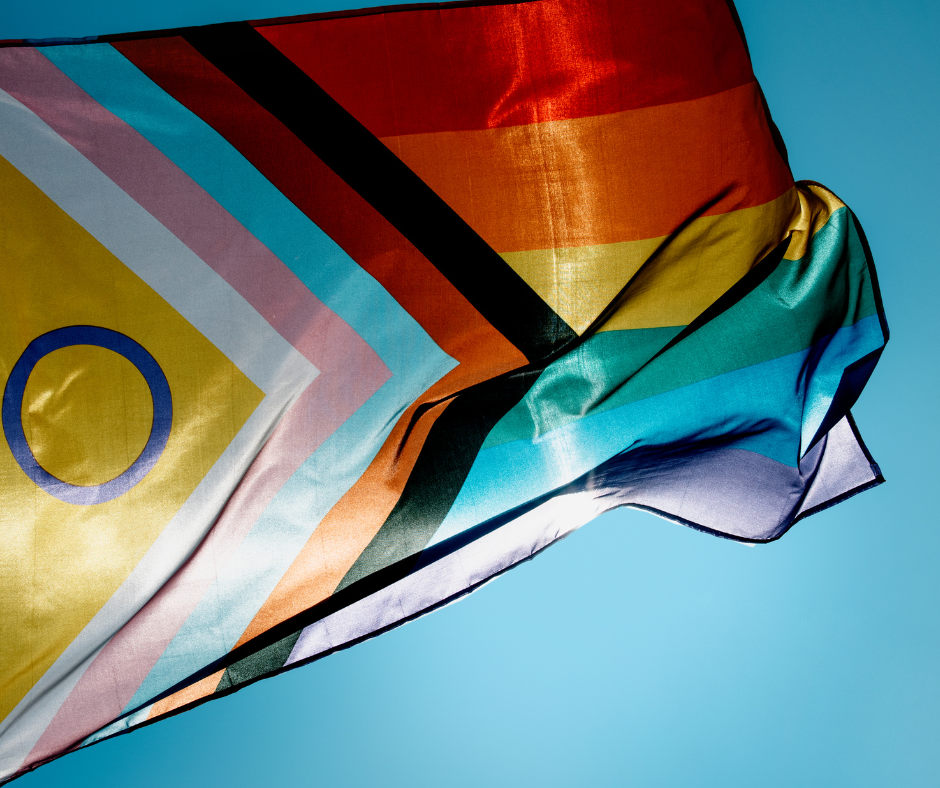
Why we launch this call
Last year, ILGA-Europe launched a new programme focused on work done by and for racialised LGBTI communities. With this call, ILGA-Europe continues its commitment to providing funds and support for this part of LGBTI movement that addresses intersectional impacts of injustice, racialisation, racism and supremacy, and specific harms affecting the lives of racialised LGBTI communities across Europe.
Many LGBTI organisations and groups run by racialised LGBTI activists continue to face obstacles in accessing funding while taking on the burden of exposing structural oppressions, building and sustaining the resilience of racialised communities, and filling the gaps in provision of services, care and spaces for racialised LGBTI people.
The work of these groups highlights the structural nature of intersectionality, brings to light many interconnected oppressions and reveals the ways they interact to produce specific harms. By continuing our support for this part of LGBTI movement, ILGA-Europe want to recognise the effort and knowledge it takes to address intersectionality, strengthen organisations run by racialised LGBTI activists, and deepen solidarity with racialised LGBTI communities.
We acknowledge a great value for the wider movement in making the work of racialised LGBTI activists more visible and better supported. We see an opportunity to share the learning from this programme to the wider movement, as we believe that solutions and approaches that include a few will pave the way and point to the solutions for many.
Aim of the program
The aim of this program is to address the intersectional impact of injustice, racialisation, racism and specific harms affecting the lives of racialised LGBTI communities across Europe.
This program will do it by:
- Supporting, strengthening and advancing the work of up to 12 European LGBTI organisations that are led by racialised LGBTI people and work with and for racialised LGBTI communities;
- Creating spaces for the group to exchange and build connections through holding regular partner meetings
Structure of the program
Participation in the program involves TWO components:
- Financial support of a project (up to €25,000 per project for 12 months),
AND
- Regular partner meetings that will bring groups together (on-line) to strategise and share work and experiences (three meetings in 12 months).
Available funding
- We can support up to 12 organisations with grants in the amount of €20,000 to €25,000: up to 10 grants to the EU-based organisations and up to two grants to non-EU based organisations;
- The project has to run for 12 months: from 1 June 2024 until 1 June 2025.
Type of organisations and groups we will support
This call is aimed specifically for registered and non-registered LGBTI-run organisations and initiative groups in Europe that are:
- Led by racialised LGBTI people and
- Working for and with racialised LGBTI communities.
Due to our donor’s limitations, we are able to support only organisations that are:
- Member organisations of ILGA-Europe as of 1 June 2024 (start of the project). If your application for membership is under consideration as of 2 April 2024 (the deadline for this application), you are eligible to apply. There is more information about membership in the Q&A document in the application package.
Non-registered organisations and groups are eligible to apply, but must partner with a registered legal entity that is able to receive funds from ILGA-Europe. This entity cannot be a physical person.
When we speak about racialised LGBTI communities, we are referring to LGBTI communities whose lives – and life experiences – are shaped and limited by racialised profiling, racist structures, policies, treatment and discrimination. Because intersectional oppressions are rooted in the ‘logic’ of a human hierarchy, with Whiteness and patriarchy as supreme, we know that harms will particularly affect people racialised as Black, as well as Indigenous people, people of colour, racialised minorities in Western and Northern Europe (such as Roma, Kurds, Sami people etc.) and in Central and Eastern Europe (such as Crimean Tatars, people from Central Asia and South Caucasus in Russia etc.
Type of projects we are looking to support
We are looking for projects whose primary aim is to address the intersectional impact of injustice, racialisation, racism and specific harms affecting the lives of racialised LGBTI communities across Europe.
We will support projects that offer to do this through one (or several) of the following ways of working:
- Facilitating fairer/better access of racialised LGBTI communities to opportunities, services, spaces and care from which these communities have been historically excluded;
- Forging and advancing collaboration and partnerships with other actors: activist groups (racialised or not; LGBTI or beyond), media, authorities and/or service providers;
- Exploring, reclaiming and enhancing voices and experiences from racialised LGBTI communities to challenge existing structures, change existing practices, mobilise wider support and engage the community;
- Strengthening internal organisational structures, skills and practices to build a sustainable presence for and with(in) the communities and wider civic society space.
Budget criteria
Budgets up to €25,000 per 12 months of the project are eligible. Only costs between 1 June 2024 to 1 June 2025 can be included in the budget. The types of costs covered by this programme are direct project costs and can include:
- Personnel costs
- Travel and event costs (both physical and digital)
- Costs related to obtaining external expertise and/or services associated with the implementation of the project
- Interpretation and translation costs
- Communication activities and campaigns related to the aim of this call, including social media and traditional media fees, production of materials, design, printing
- A fair proportion of administrative costs or core organisational costs which are linked to the implementation of the project (rent, utilities, IT, technology, telecommunications, accounting, administrative fees, fiscal sponsor fees, depreciation of new and existing equipment).
Under this call, there is NO budget percentage limitation to cover personnel and consultancy costs, as long as they are directed towards the objective of the call. This means that you can include as many human resources or external personnel costs as needed, and these costs might represent an important share of your budget.
Organisational capacity building can be included. This means projects can incorporate training, internal learning for staff and/or volunteers and other activities aimed at building the knowledge and skills needed for organisations to meet the broader purpose of this call.
You can look at an example of the prefilled budget we provided in the application package. This can give you a clearer idea what information we need from you to include and in what format for us to be able better assess the financial part of the project.
Time commitment
We are aware that many LGBTI organisations run by racialised LGBTI people operate on voluntary bases, with limited human, financial and time recourse. Therefore, we want to communicate in advance time commitment needed for this programme apart from implementing the project. This is the time needed to connect to other originations within the programme, communicate with ILGA-Europe and report back.
Participation in the programme comes with the following commitments:
- What: Three on-line meetings for programme partners to come together, share space and experiences, learn about each other’s work, build connections
When: July 2024 (kick-off), February 2025 (mid-way), and June 2025 (closing)
Time: 1h 30 mins each meeting
- What: Four progress calls with ILGA-Europe to discuss an ongoing work, implementation of the project, needs, challenges, opportunities
When: June, September, January and April
Time: 1h each call
- What: Interim financial report
When: 4 November
Time: as required depending on your capacities and needed support from us
- What: Final financial and narrative reports
When: mid-June 2025.
Time: as required depending on your capacities and needed support from us
We will schedule meetings in advance and in conversation with you.
Full information and guidance on reporting financial and administrative requirements will be provided to successful applicants.
ILGA-Europe staff that will work with you
In this programme you will be closely working with two ILGA-Europe colleagues: Nadzeya Husakouskaya and Antonella Cariello.
As a Programmes Officer, Nadzeya is the main contact between you and ILGA-Europe. They hold key elements of the programme – communication with partner organisations, organisation of connecting spaces, structure and design of the program, learnings for ILGA-Europe and the wider movement.
As a Finance and Grant Officer, Antonella oversees and supports financial aspects of the project implementation. She handles any grant management, budget and finance-related questions.
You can read more about both colleagues here.
Key Things to Consider
In selecting proposals, ILGA-Europe will prioritise projects that respond to the framework, aim, objectives, and areas of work of this call, and:
- Clearly communicate how injustice, racialisation, and racism are impacting racialised LGBTI communities in the local contexts (Questions 2.1, 4.1 and 4.2 in Application form)
- Present a well thought-through plan for how the work will be carried out and how it will contribute to positive outcomes for racialised LGBTI communities in the context and the obstacles (practical, political etc) you may face (Section 4 in Application Form and the Budget)
- Have strong ties to the local racialised LGBTI communities and connections to local LGBTI movement (or some parts of it) (Section 2 in Application Form)
- Work towards bridging gaps: in services, within and amongst the communities, with other groups and actors (Questions 4.1, 4.2, 4.3 and 5.1 in Application form)
- Strive to establish connections, collaborations, practices and tools that can live beyond the project’s lifetime (Questions 4.2, 4.3, and 5.1 in Application Form)
- Have a minimal financial capacity and some financial management system in place to implement the project (Section 3 in Application form and the Budget)
Do you have any questions?
- You can read Q&A document in the application package. The Q&A document will be updated on 26 February and 26 March after on-line Q&A sessions.
- You can come to one of the online Q&A sessions we will hold – on 21 February, Wednesday, 17.00-18.00 CET (register) and 21 March, Thursday, 12.00-13.00 CET (register). The questions and answers from these sessions will be included into an updated version of Q&A document for those won’t be able to be present at the sessions.
- While working on the budget, you can look at the example of the prefilled budget we provided in the application package. It illustrates the information that needs to be included in the budget and formats in which to provide it to make financial aspects of the project clear.
- You can e-mail nadzeya@ilga-europe.org and get an answer via e-mail. All answers to the questions received via e-mail will make it to the updated Q&A document as well.
Application deadline and timeline
- Proposals should be submitted using the attached application form and budget template to nadzeya@ilga-europe.org. The last day to submit your application (deadline) is 2 April 2024, Tuesday, 09:00 CEST (morning).
- We will inform all applicants about the outcomes of the selection process via the e-mail provided in the application by 15 May 2024 at the latest.
- Contracts will be signed with successful applicants in May 2024. Successful applicants should be available to respond to requests during that period.
- The timeline for all projects supported in this programme is fixed: Projects are to start on 1 June 2024 and end on 1 June 2025.
Advance planning information for successful applicants:
- Partner meetings will be scheduled for July 2024 (kick-off meeting) and February 2025 (mid-way meeting) as soon as the cohort of partner organisations is selected. The closing on-line meeting will happen in June 2025 and will be scheduled at the beginning of 2025.
- Progress calls with ILGA-Europe in June, September, January and April will be scheduled on a rolling basis.
- A financial interim report will be due on4 November 2024 and the final financial and narrative reports in mid-June 2025.
Application pack
Intersections: The LGBTI II Survey – Persons with Disabilities Analysis
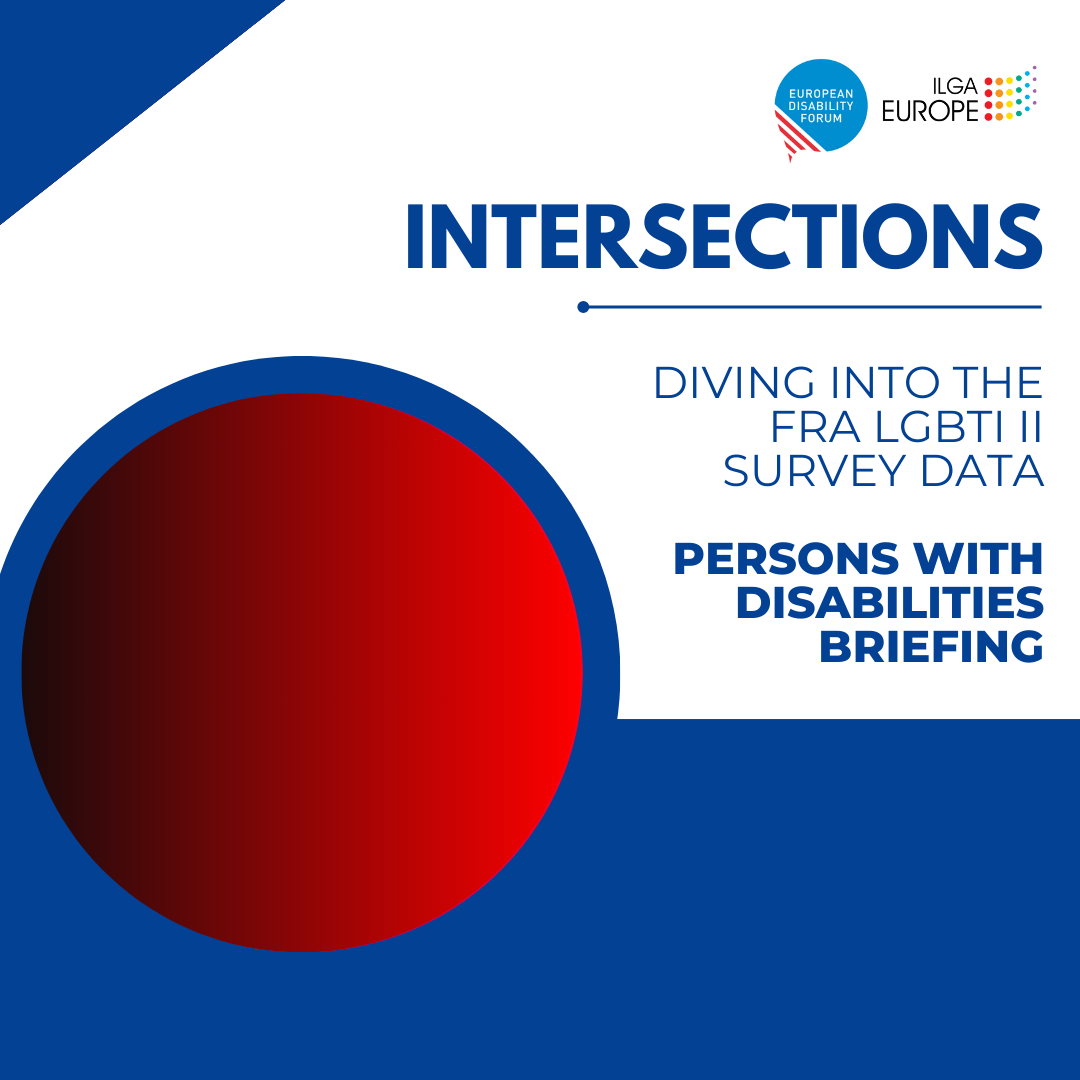
Disaggregated data, which can look deeply into the lived experiences of marginalised people, is a key demand of LGBTI and other human rights groups. With this in mind, over the last year ILGA-Europe have been partnering with a variety of NGOs in the region to analyse the FRA 2019 LGBTI Survey II data and pull out experiences of those experiencing intersectional marginalisation. This work is based on analysis co-commissioned by ILGA-Europe and TGEU.
This briefing analyses the results of the FRA LGBTI Survey II and summarises the most relevant data about the experiences of LGBTI persons with disabilities in Europe.
Intersections: The LGBTI II Survey – Bisexuals Analysis
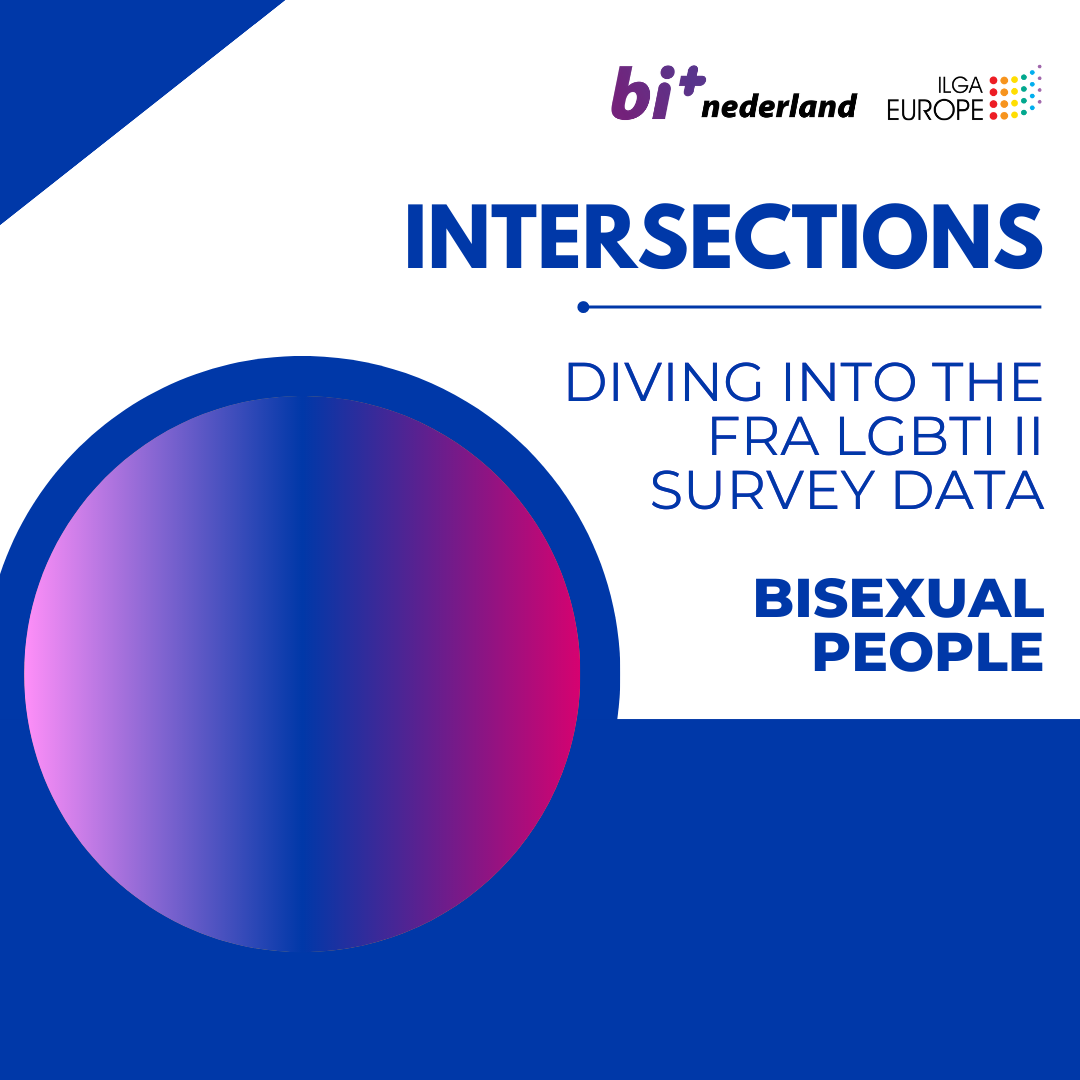
Disaggregated data, which can look deeply into the lived experiences of marginalised people, is a key demand of LGBTI and other human rights groups. With this in mind, over the last year ILGA-Europe have been partnering with a variety of NGOs in the region to analyse the FRA 2019 LGBTI Survey II data and pull out experiences of those experiencing intersectional marginalisation. This work is based on analysis co-commissioned by ILGA-Europe and TGEU.
This briefing summarises the findings of data analysis disaggregating the responses of bisexual people from the responses provided by all LGBTI respondents to the 2019 FRA LGBTI Survey II, in order to show the differences in their lived experiences compared to the overall community.
Intersections: The LGBTI II Survey – Migrant and Racial, Ethnic and Religious Minorities Analysis
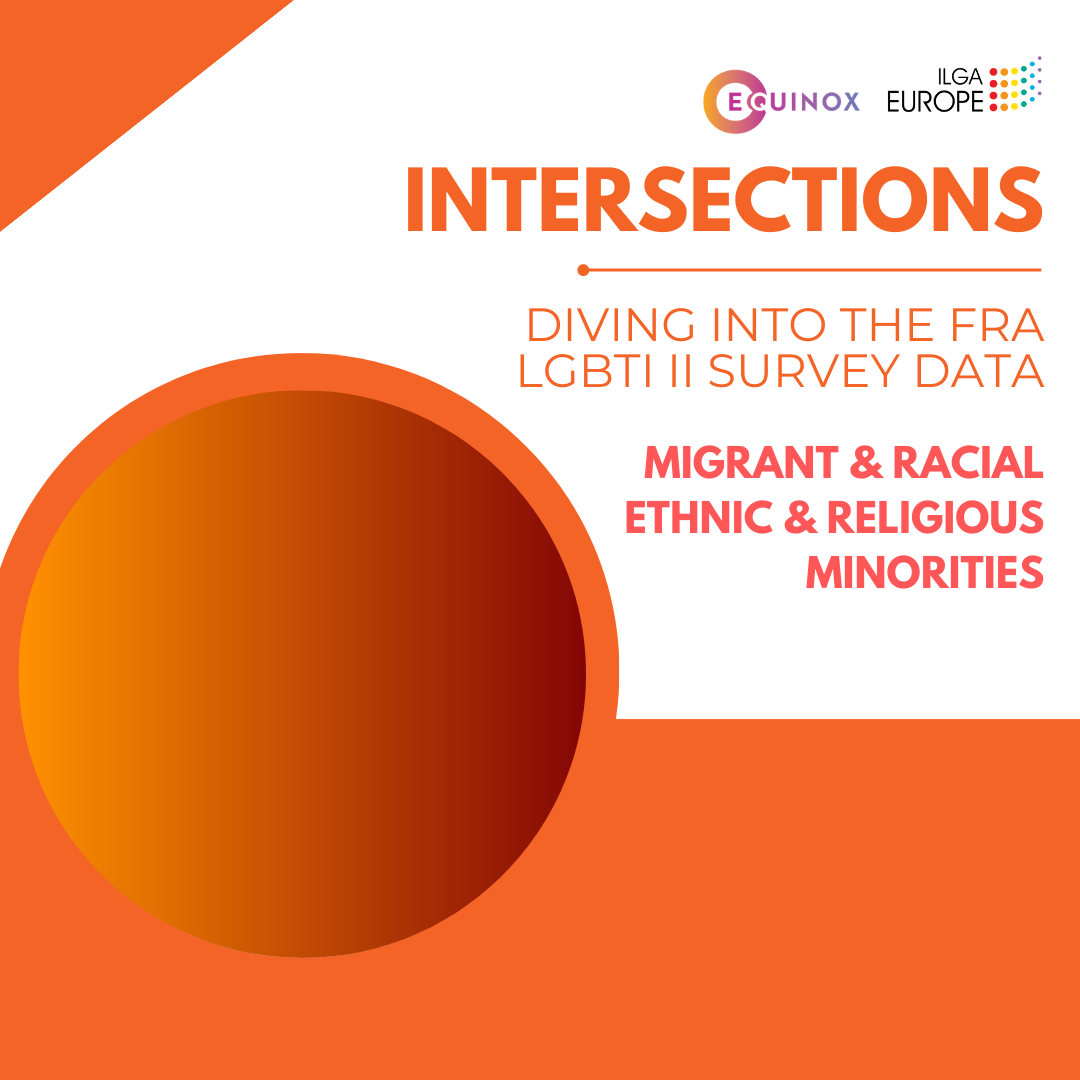
Disaggregated data, which can look deeply into the lived experiences of marginalised people, is a key demand of LGBTI and other human rights groups. With this in mind, over the last year ILGA-Europe have been partnering with a variety of NGOs in the region to analyse the FRA 2019 LGBTI Survey II data and pull out experiences of those experiencing intersectional marginalisation. This work is based on analysis co-commissioned by ILGA-Europe and TGEU.
This briefing seeks to elaborate on existing analysis of the FRA LGBTI Survey II, and summarises the most relevant data about the experiences of LGBTI persons in Europe with a migration background coming from outside of EU, LGBTI non-migrant ethnic minorities and LGBTI religious minorities in the EU.
To understand the challenges faced by LGBTI migrants from outside of the EU and belonging to ethnic or religious minorities, we created sub-populations of respondents, who identified themselves as belonging to these groups, and compared them with all respondents to the survey.
Intersections: The LGBTI II Survey – Trans and Non-binary Analysis
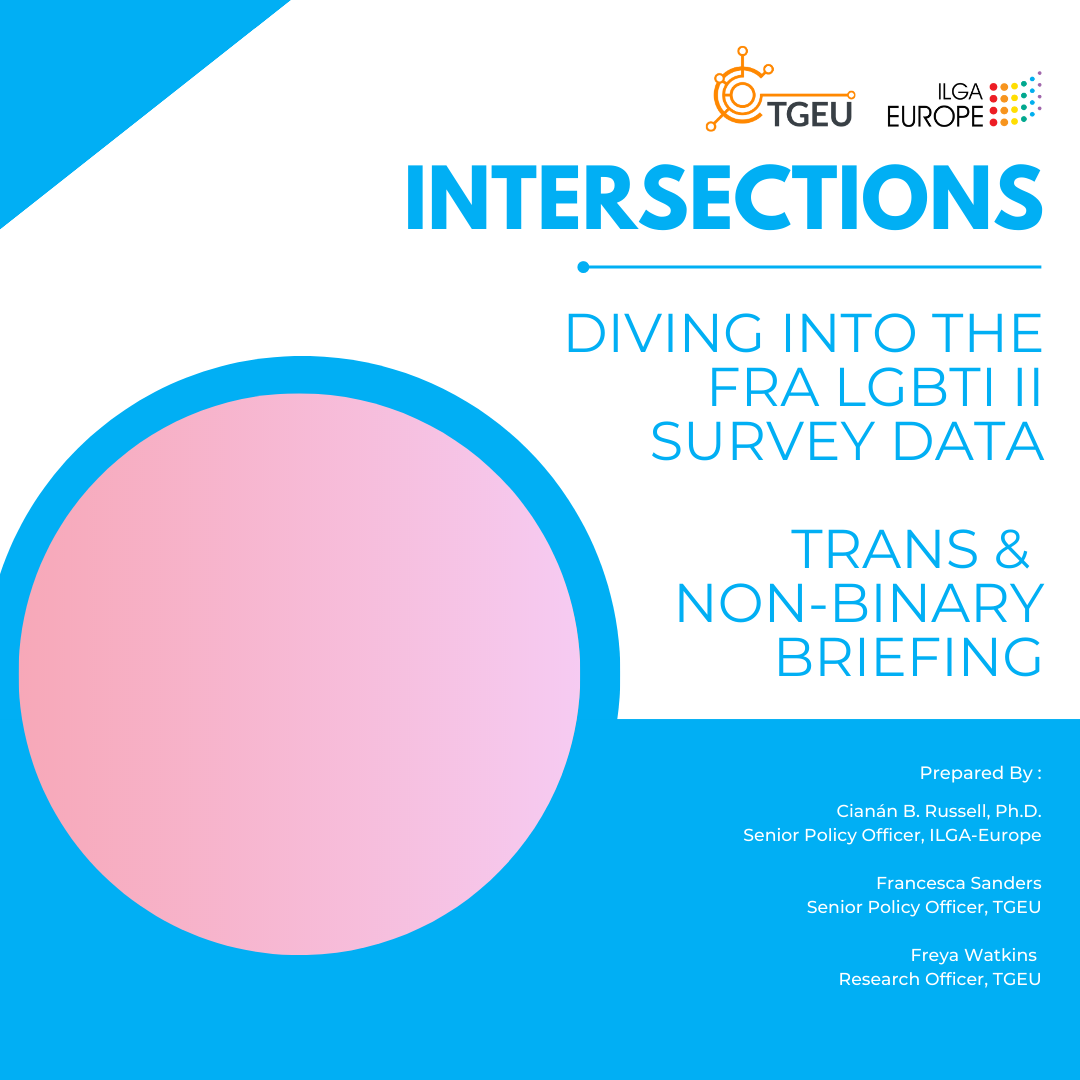
Disaggregated data, which can look deeply into the lived experiences of marginalised people, is a key demand of LGBTI and other human rights groups. With this in mind, over the last year ILGA-Europe have been partnering with a variety of NGOs in the region to analyse the FRA 2019 LGBTI Survey II data and pull out experiences of those experiencing intersectional marginalisation. This work is based on analysis co-commissioned by ILGA-Europe and TGEU.
This briefing on trans and non-binary people summarises the findings of data analysis disaggregating the responses of trans and non-binary people from the responses provided by all LGBTI respondents to the 2019 FRA LGBTI Survey II, in order to show the differences in their lived experiences. To understand the diverse challenges faced by trans and non-binary people, we created subpopulations of trans men, trans women, and non-binary people, and compared them with all respondents to the survey.
Despite limitations, this data set remains the largest available of trans and
non-binary people in Europe and provides a valuable insight into the experiences of a large number of trans and non-binary people across the EU. That it has been and will be repeated enables useful comparisons over time.
Intersections: The LGBTI II Survey – Intersex Analysis
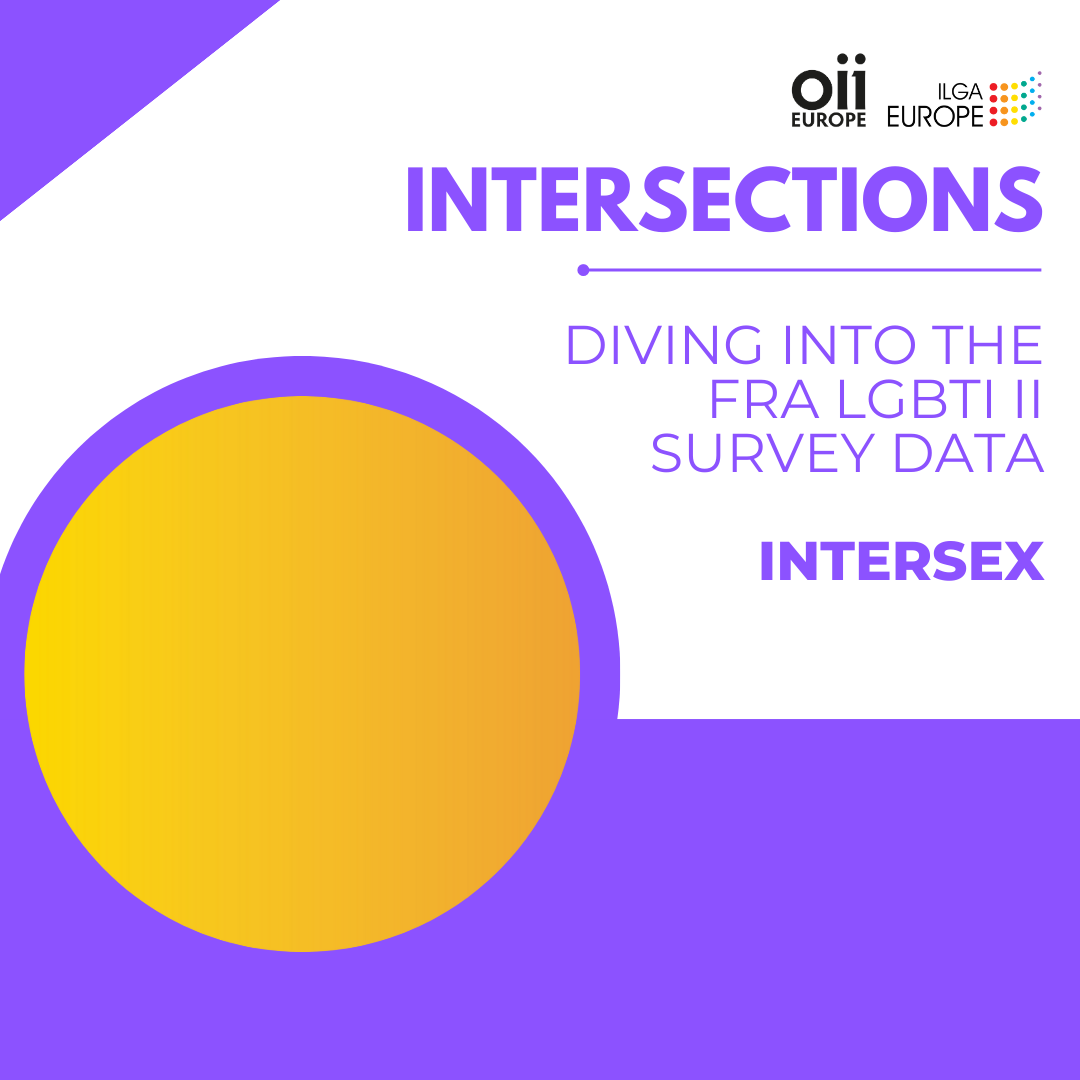
Disaggregated data, which can look deeply into the lived experiences of marginalised people, is a key demand of LGBTI and other human rights groups. With this in mind, over the last year ILGA-Europe have been partnering with a variety of NGOs in the region to analyse the FRA 2019 LGBTI Survey II data and pull out experiences of those experiencing intersectional marginalisation. This work is based on analysis co-commissioned by ILGA-Europe and TGEU.
This briefing on intersex people summarises the findings of data analysis disaggregating the responses of intersex people from the responses provided by all LGBTI respondents to the 2019 FRA LGBTI Survey II, in order to show the differences in their lived experiences.
In 2019, FRA conducted the second round of the LGBTI Survey which shows how LGBTI
people experience their fundamental rights in daily life across Europe. For the first time, the survey included the experiences of intersex people, and determined that intersex people experience some of the highest levels of discrimination across all groups included in the study.
This briefing on intersex people was developed collaboratively with OII Europe.
Intersections: The LGBTI II Survey – Older People Analysis
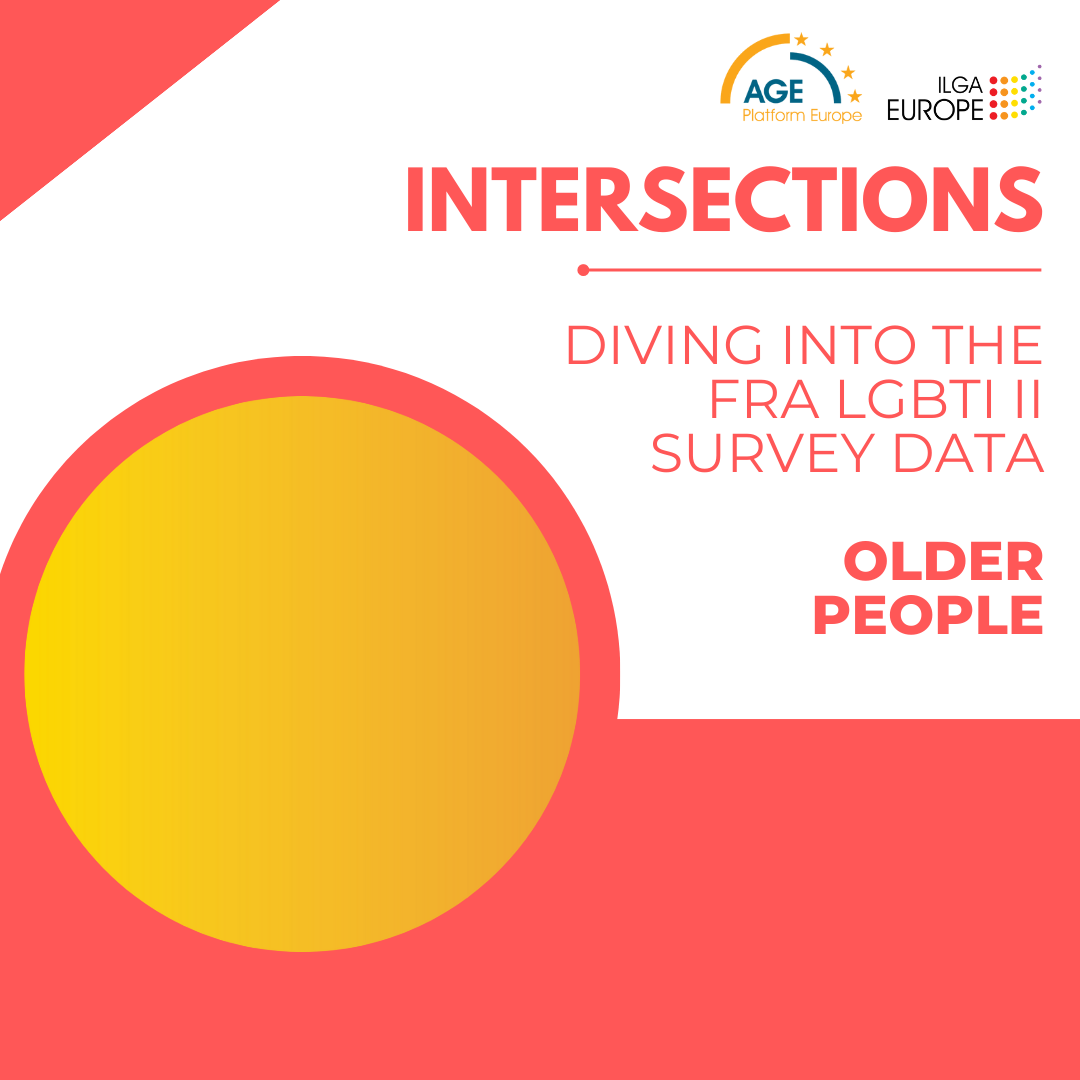
Disaggregated data, which can look deeply into the lived experiences of marginalised people, is a key demand of LGBTI and other human rights groups. With this in mind, over the last year ILGA-Europe have been partnering with a variety of NGOs in the region to analyse the FRA 2019 LGBTI Survey II data and pull out experiences of those experiencing intersectional marginalisation. This work is based on analysis co-commissioned by ILGA-Europe and TGEU.
This briefing on older people summarises the findings of data analysis disaggregating the responses of older LGBTI people from the responses provided by all LGBTI respondents to the 2019 FRA LGBTI Survey II, in order to show the differences in their lived experiences. In order to make sure that the point of view of older LGBTI people was represented in full, this document is the result of a collaboration between ILGA-Europe ad AGE Platform Europe, both contributing in the data analysis and drafting of the briefing.
Call for project proposals: Addressing LGBTI homelessness in the EU
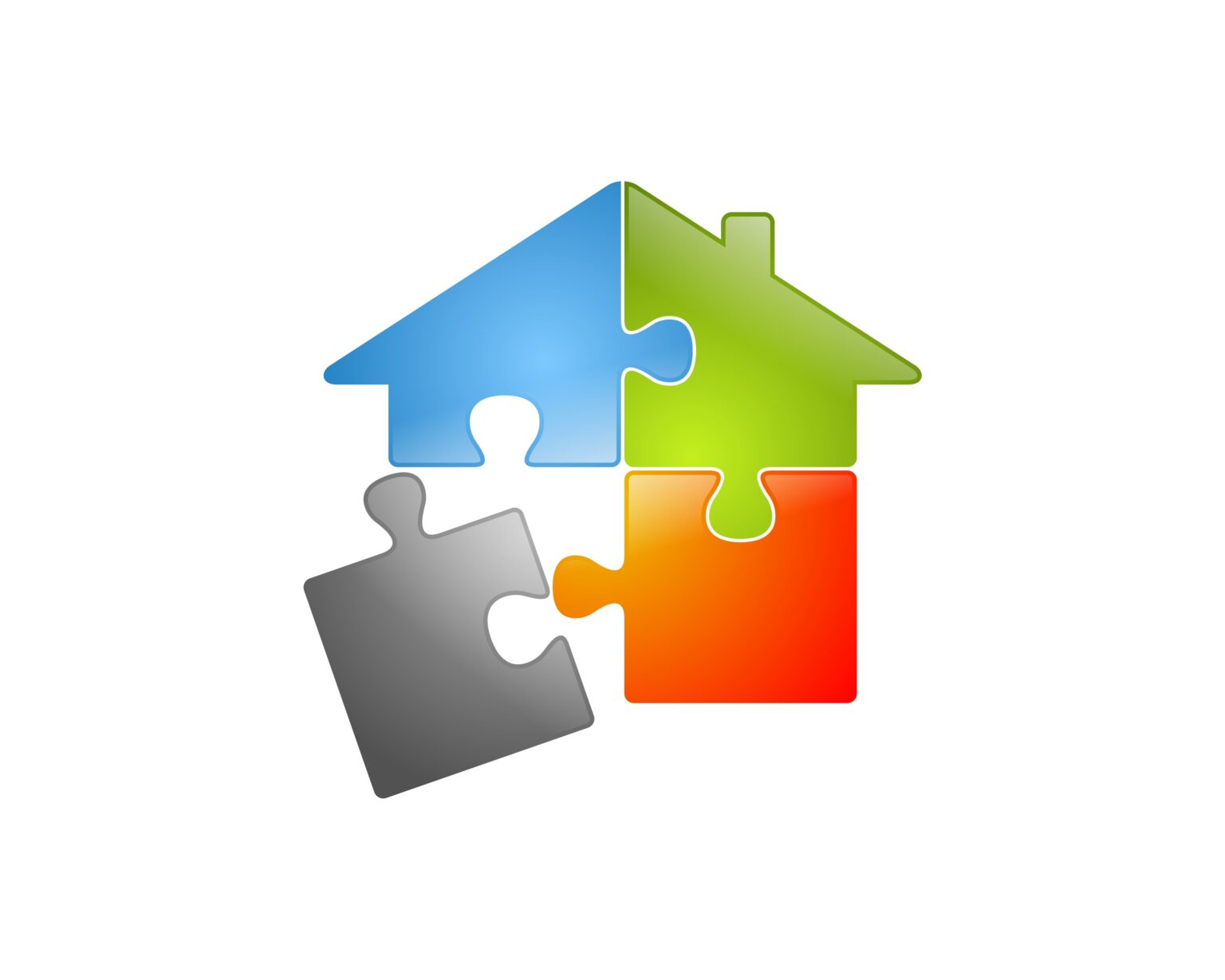
Why we are launching this programme
In 2020, the Fundamental Rights Agency (FRA) released a survey that estimates that one in five members of the LGBTI community in the EU experience homelessness, rising to one in three for trans people and nearly 40% for intersex people. Lack of institutional support, social rejection and identity-related family conflict are amongst the causes for LGBTI homelessness. Undeniably, the pandemic, deepening socio-economic inequalities and the rise of anti-LGBTI rhetoric, anti-trans attacks and the anti-gender movement further exacerbated the situation around homelessness of LGBTI communities, especially with youth.
Yet, LGBTI homelessness remains hidden in Europe. We lack the data and the robust research to fully understand the prevalence, forms and dynamics of LGBTI homelessness in different local contexts in Europe. The lack of knowledge across the European Union leads to a lack of targeted services, absence of national policies specifically addressing the issue of LGBTI homelessness, limited funding, if any, for programmes that include or focus on unhoused LGBTI communities. Often, LGBTI organisations have to step up to support their communities in situations of homelessness where there are gaps in services and when assistance is unavailable or inaccessible.
It is well known that access to housing is a precondition for access to health, employment, education, and social services. This is why we are launching this programme, which will sustain the vital work of understanding the root causes and forms of LGBTI homelessness and advocate for improving access of LGBTI communities to services and housing.
The programme focuses on data collection, advocacy efforts, and/or collaboration between sectors, systems and services in addressing LGBTI homelessness.
Through this programme we want to enhance and advance the work of LGBTI organisations with considerable existing expertise in the field. We believe that having a small group of strong organisations with a strengthened experience in the area of LGBTI homelessness will bring new learnings and insights that can be shared with a wider movement and benefit other organisations who are at the beginning of their work on homelessness in their respective countries.
Structure of the programme
The programme has two interconnected components:
- Financial support for the implementation of a project (20.000 euro per project), AND
- Peer-learning that will bring grantee partners together (on-line) on a regular basis to strengthen the network amongst organisations, enhance possible collaboration, exchange learning, share challenges and solutions.
Important! When you apply for funding under this call, please be aware that you commit to both of the components of this programme.
Aim of the programme
The aim of this programme is to:
- Bring together a small group of 6-7 LGBTI organisations across the European Union that have demonstrated experience in understanding, addressing and/or preventing LGBTI homelessness in their respective countries and/or regions;
- Support, strengthen and advance their work on LGBTI homelessness through a combination of grants and regular peer-learning/networking meetings.
Types of organisations we will support
LGBTI-run organisations that
- are based and work with LGBTI communities in the European Union; AND
- have demonstrated experience, history and track-record of working on LGBTI homelessness.
Non-registered organisations are eligible to apply if they partner with a registered legal entity that is able to receive funds from ILGA-Europe. This entity cannot be a physical person.
Your experience in working with LGBTI homelessness can be through investigating the root causes, analysis of the bigger picture, focusing on prevention and/or short-term solutions (for example, running shelters or providing services). The projects submitted to this programme, however, need to fall within the scope described below, in the section “Types of projects…”. This programme is not designed to support running a shelter and providing direct assistance.
Type of projects we are looking to support
We understand that the most immediate hands-on form of addressing LGBTI homelessness is providing shelter and other services. However, this call is designed to support systemic and sustainable efforts to address the gaps in the existing systems, not filling these gaps by own initiatives. Thus, we won’t be able to support the running of shelters or service provision. This call invites projects that aim at data collection, strategic collaborations with existing organisations and service providers working with homelessness, and advocacy with public authorities to ensure that practices and policies around homelessness acknowledge, account for and include experiences of LGBTI communities and pro-actively meet the needs of these communities.
Therefore, we are looking for projects that will fall into one, two or three of the following areas of work.
- Data collection and research activities to map and/or document the scope, forms, root causes and consequences of LGBTI homelessness in a given local context*.
- Developing/strengthening alliances and partnerships with service providers and/or other partners working on homelessness and socio-economic justice with the explicit purpose of fair distribution of labour amongst the actors in this field and with focus on influencing their practices so they acknowledge experiences of LGBTI communities and pro-actively meet the needs of these communities
- Advocacy activities aimed at establishing new and strengthening existing contacts and collaborations with public authorities and governmental officials with an aim of developing, improving and implementing effective public policies to reflect the lived experience of homeless LGBTI people and meet their needs.
*The documentation and research projects need to have a clear dissemination/advocacy plan that clearly explains how outcomes of documentation and research activities are going to be used in further work, including advocacy and alliance-building.
Key information
- ILGA-Europe aims to support up to 7 organisations with grants of €20,000 each.
- The project should be implemented within a period of 1 July 2023 until 1 July 2024, i.e. 12 months Only costs between 1 July 2023 to 1 July 2024 will be eligible. The final reporting will be due no later than 15 July 2024.
- Peer-learning meetings will happen on-line on a regular basis, approximately every two months during the project period. Over the course of 12 months, we will have up to seven meetings (up to three hours each). The first meeting will be a webinar to inform you on the financial and administrative requirements under this call. We invite you to account for this staff time in your budget.
Budget criteria
The types of costs covered through this fund are direct project costs and can include:
- Personnel costs
- Travel and event costs (both physical and digital)
- Costs related to obtaining external expertise and/or services associated with the implementation of the project
- Interpretation and translation costs
- Communication activities and campaigns related to the aim of this call, including social media and traditional media fees, production of materials, design, printing
- A fair proportion of administrative costs or core organisational costs which are linked to the implementation of the project (rent, utilities, IT, technology and telecommunications, accounting, administrative fees, fiscal sponsor fees, depreciation of new and existing equipment).
Under this call there is no budget percentage limitation to covering personnel and consultancy costs, as long as they are clearly directed towards the objectives of the call.
Organisational capacity building can be included. Projects can incorporate training, internal learning for staff and/or volunteers and other activities aimed at building the knowledge and skills needed for organisations to take on meet the broader purpose of this call.
Reporting and Communication
The reporting comprises of narrative reports and financial reports.
Narrative reporting: For the duration of the project we will have regular check-in calls with you – a one-hour call every three months. These calls will serve as an informal form of reporting on the content and administrative sides of the project. During these conversations we will discuss the project implementation, threats, opportunities, challenges, and possible capacity building needs. At the end of the project, you will have to submit a final narrative report using a template we will provide. The final narrative report covers key elements of the project implementation (evaluation of activities, reflection on the impact the project had on the local context, target groups and the organisation itself etc)
Financial reporting: Mid-way and at the end of the project, you will need to report financially on how the funds were spent. Financial reporting will require some basic knowledge of Excel and the applicant will require some basic administrative and financial systems in order to manage the grant (e.g. cash management, tracking of expenditure, record-keeping). Full information and guidance on reporting financial and administrative requirements will be provided to successful applicants.
We believe that the broader LGBTI movement can benefit from the learning of these projects. We would like to share learning from the work done under this funding with other LGBTI activists in Europe and Central Asia. This knowledge can be shared through articles, educational materials, online learning sessions among others. Sharing learning will be ILGA-Europe’s responsibility and we will work with you to identify what information can be shared in what ways, and with whom.
Key Things to Consider
In selecting proposals, ILGA-Europe will prioritise projects that:
- Respond to the framework, aim, objectives, and areas of work of this call
- Are implemented by LGBTI-run organisations in the European Union that have a demonstrated experience, history and track-record of working to address LGBTI homelessness
- Demonstrate clear understanding of their local context around LGBTI homelessness
- Present a clear plan for how the envisaged change is going to come about in these contexts
- Seek to establish practices/tools/solutions that can live beyond the project’s lifetime
- Have the potential to enhance the movement’s thinking on LGBTI homelessness (including structural root causes and effects) and working towards socio-economic justice for LGBTI communities in general.
Deadline and Timeline
- Proposals should be submitted using the application form and budget template. The last day to submit your application (deadline) is 1 May 2023, Monday, 23:59 CEST.
- We will review applications and inform all applicants about the results of the selection via the e-mail address provided in the application by 5 June 2023.
- Contracts will be signed with organisations in June 2023. Successful applicants should be available to respond to requests during that period. The fixed start date for all projects is 1 July 2023.
- To submit an application or if you have any questions in the preparation of your project proposal, please contact: nadzeya@ilga-europe.org
Any questions?
All answers were returned via email and are published on this page, in order to support equal access to information among all applicants.
Application documents
Intersections: The LGBTI II Survey Analysis project
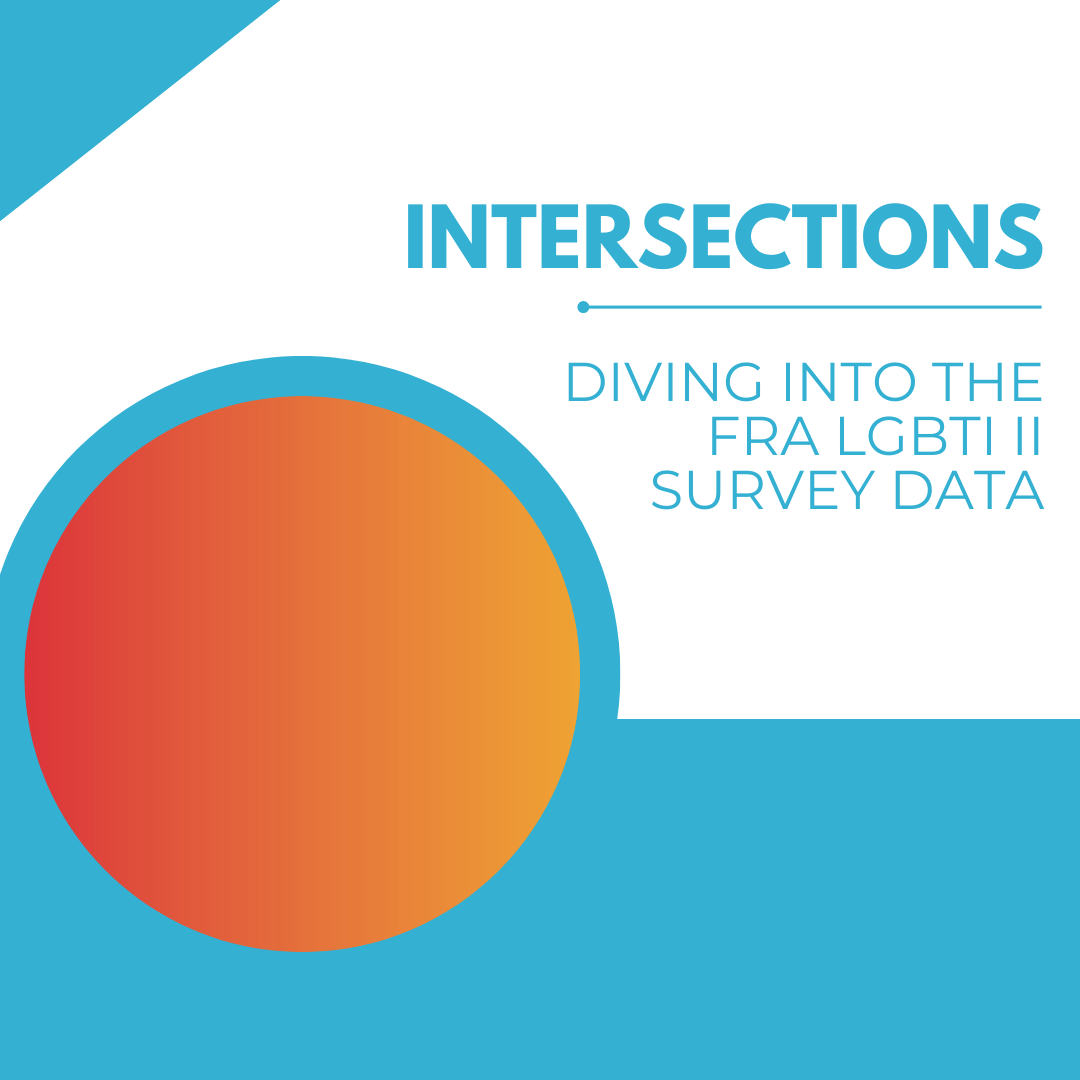
Disaggregated data, which can look deeply into the lived experiences of marginalised people, is a key demand of LGBTI and other human rights groups. With this in mind, over the last year ILGA-Europe have been partnering with a variety of NGOs in the region to analyse the FRA 2019 LGBTI Survey II data and pull out experiences of those experiencing intersectional marginalisation.
This work is based on analysis co-commissioned by ILGA-Europe and TGEU.
Our Latest Call for Project Applications: Video Explanations

What kinds of organisations can apply?
What do we mean when we say ‘racialised’?
What types of work can you apply for support for?
What happens when you are part of the programme?
Any more questions?
If you have any questions in the preparation of your project proposal please submit them via e-mail to grants@ilga-europe.org
We will answer all of your questions via e-mail and then publish answers on https://www.ilga-europe.org/news/no-one-left-behind/ on 27 February and on 23 March, in order to share the information among all applicants.
The closing deadline is 2 April 2023, Sunday, 23:59 CEST.
New Call for Applications for Projects Working with Racialised LGBTI Communities
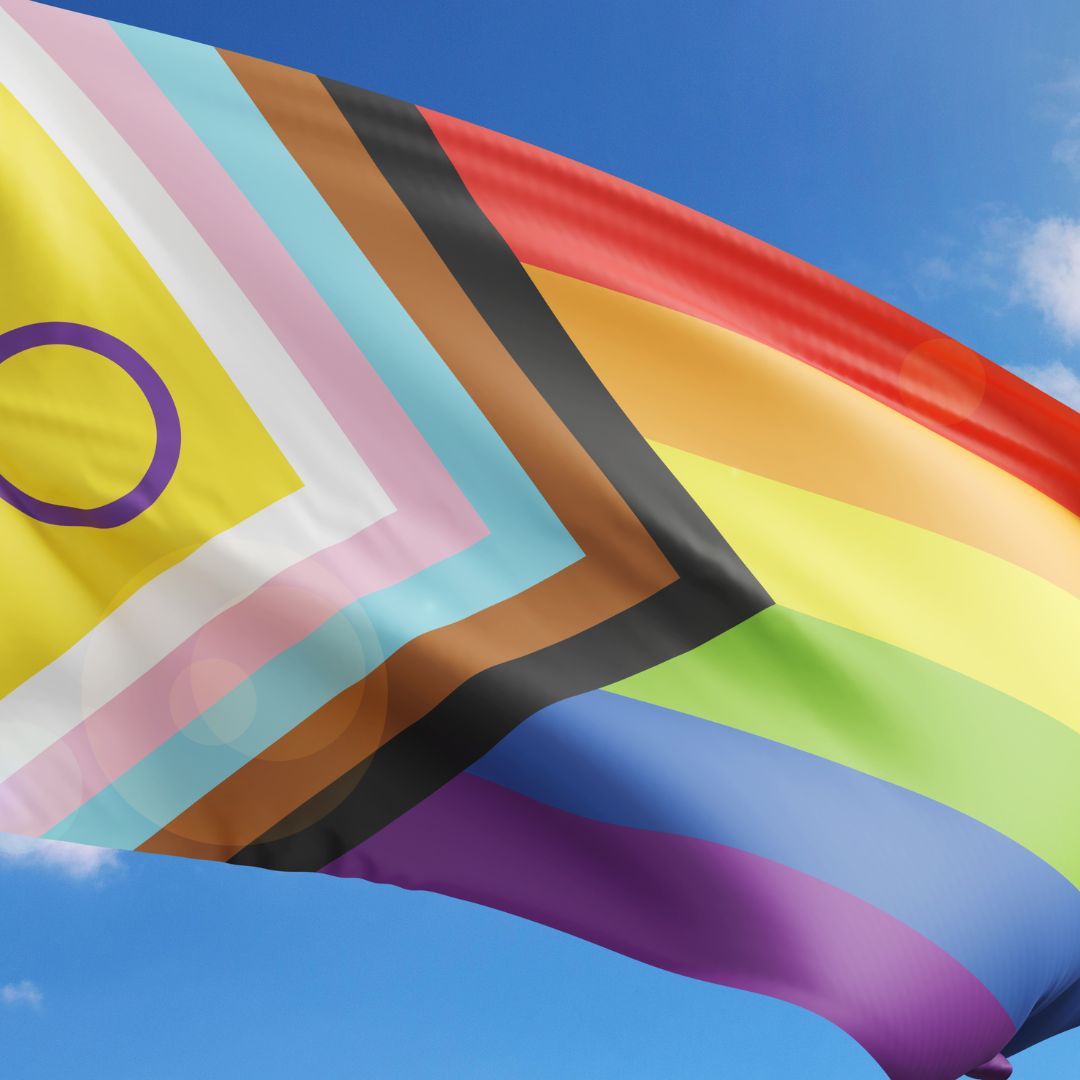
Why we are launching this programme
Currently, the LGBTI movement across Europe operates in an increasingly hostile environment that directly affects the lives of LGBTI communities and the work of activists. This environment is marked by anti-rights opposition, anti-democratic developments, rising unemployment, economic crises, ongoing and brewing geo-political conflicts, deepening structural inequalities, fear-mongering, mounting transphobic, and sexist and racist rhetoric and violence.
In these circumstances, many divisions are imposed and (re)created within LGBTI movements and across different types of activism. At ILGA-Europe, we believe it is of crucial importance to support work that highlights the structural nature of intersectionality, which connects across work, and to recognise how structural oppressions interact to produce specific harms.
This is why we are launching this 12-month programme. The programme is focused on work being done by and for racialised LGBTI communities. It will support work within the LGBTI movement which is addressing the intersectional impact of socio-economic injustice, racialisation, racism and supremacy, and its specific impacts on the lives of racialised LGBTI communities across Europe.
So many organisations and groups have been doing incredible work and contributing to change, while at the same time being historically excluded from funding. By supporting these groups, we also wish to recognise and acknowledge the specialised knowledge and skills involved in addressing intersectionality. This can mean anything from exposing structural oppressions that shape harm; building and sustaining the resilience of racialised communities; developing and applying anti-racist, feminist and alternative approaches; to working through – and in spite of – institutional violence and trauma.
This programme expresses our commitment to continue our engagement with socio-economic justice and to strengthen our work on anti-racism. We see a great value for the wider movement in making the work of the organisations supported, disseminated and visible. We see an opportunity to bring the learning from this programme to the wider movement, as we believe that solutions and approaches that include a few will pave the way and point to the solutions for many.
Structure of the Programmne
The program has two interconnected components:
- Financial support for the implementation of a project (up to 20.000 euro per project), AND
- Learning and networking that will bring grantees together (on-line) on a regular basis to exchange learning, share challenges and solutions, build solidarity and find points for collaboration and inspiration.
Important! When you apply for funding under this call, please be aware that you commit to both of the components of this program.
Aim of the Programme
The aim of this program is to:
- Bring together a group of up to 15 European LGBTI organisations/groups across Europe that work on addressing the intersectional impact of socio-economic injustice, racialisation, racism and supremacy and specific harms affecting the lives of racialised LGBTI communities across Europe.
- Support, strengthen and advance their work on socio-economic justice for racialised LGBTI communities through a combination of grants and regular peer-learning/networking meetings.
Scope of Eligible WorK
By socio-economic justice in this programme, we mean the removal of obstacles and oppressions which disproportionately worsen the social and economic conditions of already marginalised populations. Social and economic conditions include but might not be limited to education, housing, work, health, and adequate standard of living.
When we speak about racialised LGBTI communities, we are referring to LGBTI communities whose lives – and life experiences – are shaped and limited by racialised profiling, racist structures, policies, treatment and discrimination.
Because intersectional oppressions are rooted in the ‘logic’ of a human hierarchy, with Whiteness and patriarchy as supreme, we know that harms will particularly affect people racialised as Black, as well as Indigenous people, people of colour, racialised minorities in Western and Northern Europe (such as Roma, Kurds, Sami people etc.) and in Central and Eastern Europe (such as Crimean Tatars, people from Central Asia and South Caucasus in Russia etc.) In other words, racialisation will always create particular negative impacts on people who are seen as furthest from Whiteness and patriarchy (including gender binarism and hetero-normativity).
We understand that migration/refugee status and faith/religion intersections are often part of lived experiences of racialised LGBTI communities. Migration/refugee status is racialised profiling at its core. In the same way, religious dimensions are often part of racialised profiling, since they are rooted in the ‘otherness’ of non-Christians, or those whose type of Christianity deviates from ‘White’ denominations in a given society. This is why these intersections can be indicated and included in a project, given its focuses on the ways in which this type of racial profiling intersects with socio-economic justice.
Types of Organisations we will support
LGBTI-run organisations and initiative groups in Europe*:
- that have a history and track record of practice of working with and for racialised LGBTI communities
- where racialised LGBTI communities are part of the organisational structure (this is a mandatory requirement)
- that have some experience of working on socio-economic effects and lived experiences of racialised LGBTI communities (this is desirable, but not a requirement.
PLEASE NOTE: Non-registered organisations are eligible to apply, but must partner with a registered legal entity that is able to receive funds from ILGA-Europe. This entity cannot be a physical person.
* For this call Europe is considered to include the following countries: Albania, Andorra, Armenia, Austria, Azerbaijan, Belarus, Belgium, Bosnia and Herzegovina, Bulgaria, Croatia, Cyprus, Czech Republic, Denmark, Estonia, Finland, France, Georgia, Germany, Greece, Hungary, Iceland, Ireland, Italy, Kosovo, Latvia, Liechtenstein, Lithuania, Luxembourg, Malta, Monaco, Montenegro, Netherlands, North Macedonia, Norway, Poland, Portugal, Republic of Moldova, Romania, Russian Federation, San Marino, Serbia, Slovak Republic, Slovenia, Spain, Sweden, Switzerland, Turkey, Ukraine and the United Kingdom.
Type of Projects we are looking to support
We are looking for the projects that will fall into one or both of the following areas of work.
- Evidence-based awareness raising and mobilisation work that focuses on the forms and scope of the impact intersectional marginalisation and structural oppressions have on the socio-economic status and opportunities for racialised LGBTI people.
In a broad sense, evidence-based awareness raising and mobilisation work refers to any activities that aim at gathering and using the knowledge, skills and various tools to defend, promote and advance socio-economic justice for racialised LGBTI people (see the Application Form for ideas/possibilities under this area).
- Developing/strengthening collaboration with service providers and/or other partners working on socio-economic justice with the explicit purpose of fair distribution of labour amongst the actors in this field.
As a broader impact of COVID and diverse unfolding crises and conflicts in the region show, LGBTI organisations often step up as service providers and fill the gap left by the governments and social and other services. However, it is important to understand that this call is not designed to support service provision. It can only support work that aims at strategic collaborations and partnership with existing organisations and service providers, with a focus on influencing their practice so they acknowledge experiences of racialised LGBTI communities and pro-actively meet the needs of these communities (see Application Form for ideas/possibilities under this area).
Key information
- ILGA-Europe aims to support up to 15 grants to the amount of €15,000 to €20,000.
- The project should be implemented within a period of 12 months. The programme runs from 1 June 2023 until 1 June 2024. (Only costs between 1 June 2023 to 1 June 2024 will be eligible). The final reporting will be due no later than 15 June 2024.
- Peer-learning meetings will happen on-line on a regular basis, approximately every six weeks during the project period. Over the course of 12 months, we will have up to eight meetings (up to three hours each). The first meeting will be a webinar to inform you on the financial and administrative requirements under this call. Please account for this staff time in your budget.
- For the duration of the project we will have regular check-in calls with you – a one-hour call every three months. During these conversations we will discuss the project implementation, threats, opportunities, challenges, and possible capacity building needs.
Budget Criteria
The types of costs covered through this fund are direct project costs and can include:
- Personnel costs
- Travel and event costs (both physical and digital)
- Costs related to obtaining external expertise and/or services associated with the implementation of the project
- Interpretation and translation costs
- Communication activities and campaigns related to the aim of this call, including social media and traditional media fees, production of materials, design, printing
- A fair proportion of administrative costs or core organisational costs which are linked to the implementation of the project (rent, utilities, IT, technology and telecommunications, accounting, administrative fees, fiscal sponsor fees, depreciation of new and existing equipment).
Under this call there is no budget percentage limitation to covering personnel and consultancy costs, as long as they are clearly directed towards the objectives of the call.
Organisational capacity building can be included. Projects can incorporate training, internal learning for staff and/or volunteers and other activities aimed at building the knowledge and skills needed for organisations to meet the broader purpose of this call.
Reporting and communication
Mid-way and at the end of the project, you will need to report financially on how the funds were spent. Financial reporting will require some basic knowledge of Excel and the applicant will require some basic administrative and financial systems in order to manage the grant (e.g. cash management, tracking of expenditure, record-keeping). Full information and guidance on reporting financial and administrative requirements will be provided to successful applicants.
We believe that the broader LGBTI movement can benefit from the learning of these projects. We would like to share learning from the work done under this funding with other LGBTI activists in Europe and Central Asia. This knowledge can be shared through articles, educational materials, online learning sessions among others. Sharing learning will be ILGA-Europe’s responsibility and we will work with you to identify what information can be shared in what ways, and with whom.
key things to consider
In selecting proposals, ILGA-Europe will prioritise projects that:
- Demonstrate clear understanding of how the intersection of LGBTI identities, socio-economic injustice and racialisation works in their local contexts
- Present a clear plan for how the envisaged change is going to come about in these contexts
- Seek to establish practices/tools/solutions that can live beyond the project’s lifetime
- Have the potential to enhance the movement’s thinking on anti-racism and working towards socio-economic justice in general and for socio-economic justice for racialised LGBTI communities in particular.
- Respond to the framework, aim, objectives, and areas of work of this call
- Are implemented by LGBTI-run organisations and initiative groups in Europe that have history and practice of working with and for racialised LGBTI communities
Deadline and Timeline
- Proposals should be submitted using the attached application form and budget template. The last day to submit your application (deadline) is 2 April 2023, Sunday, 23:59 CEST.
- We will review applications, decide on projects to be supported and inform all applicants about the results of the review via the e-mail address provided in the application by 5 May 2023.
- Contracts will be signed with organisations in May 2023. Successful applicants should be available to respond to requests during that period. The project must start on 1 June 2023.
- To submit an application or if you have any questions in the preparation of your project proposal, please contact: grants@ilga-europe.org
Any Questions?
If you have any questions in the preparation of your project proposal please submit them via e-mail to grants@ilga-europe.org
We will answer all of your questions via e-mail and then publish answers on a dedicated ilga-europe.org website page on 27 February and on 23 March, in order to share the information among all applicants.
Application documents
Intersections: The LGBTI II Survey – Youth Analysis
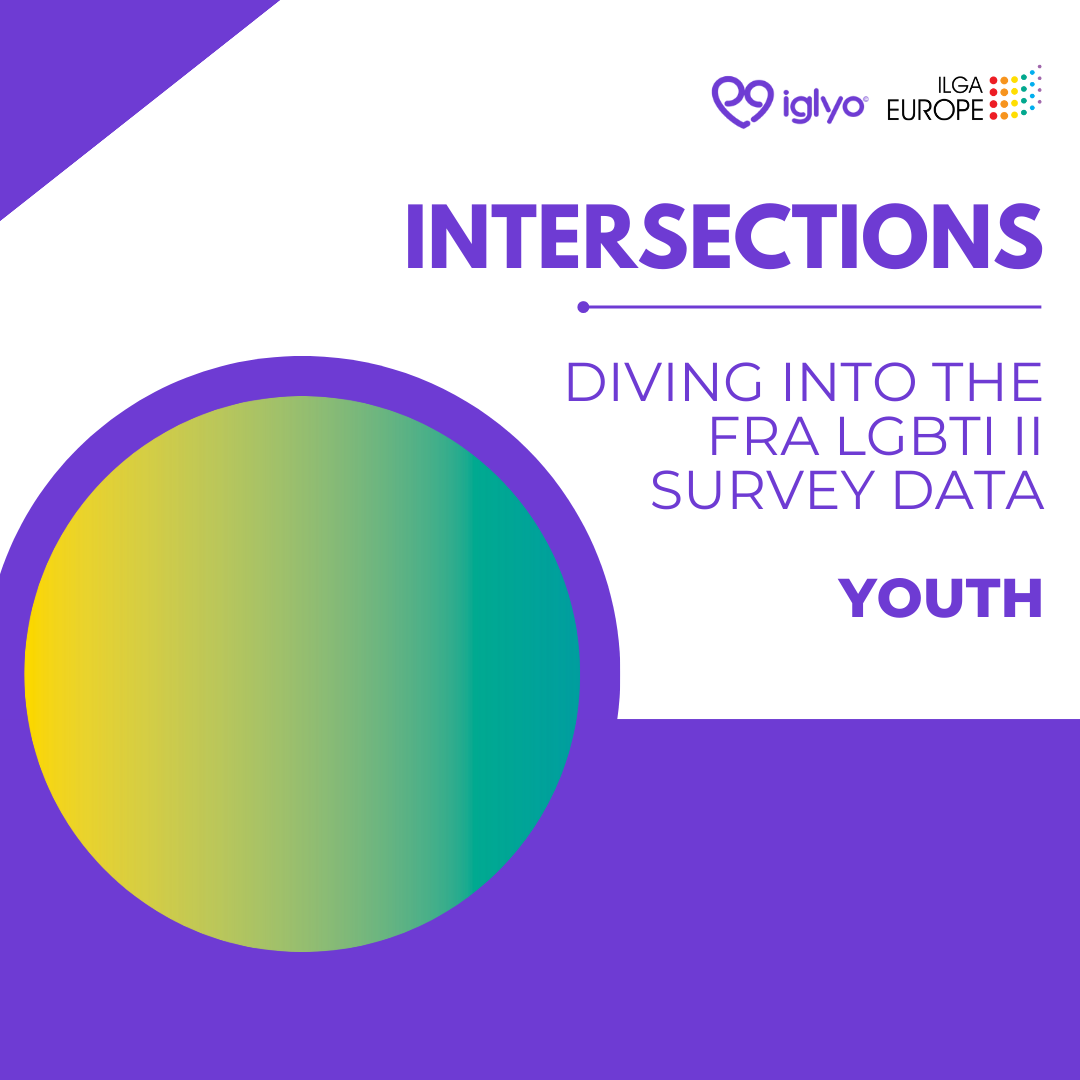
Disaggregated data, which can look deeply into the lived experiences of marginalised people, is a key demand of LGBTI and other human rights groups. With this in mind, over the last year ILGA-Europe have been partnering with a variety of NGOs in the region to analyse the FRA 2019 LGBTI Survey II data and pull out experiences of those experiencing intersectional marginalisation. This work is based on analysis co-commissioned by ILGA-Europe and TGEU.
This, our briefing on LGBTI Youth, in which we created sub-populations of respondents aged 15-24, 15-17 and 18-24, and compared them with all respondents to the survey, was carried out alongside the International Lesbian, Gay, Bisexual, Transgender, Queer & Intersex Youth and Student Organisation (IGLYO). In coming months, watch this space for further in-depth briefings on intersex people, religious and ethnic minorities, older LGBTI people, trans people, and others.
Intersections: The LGBTI II Survey – Lesbians Analysis
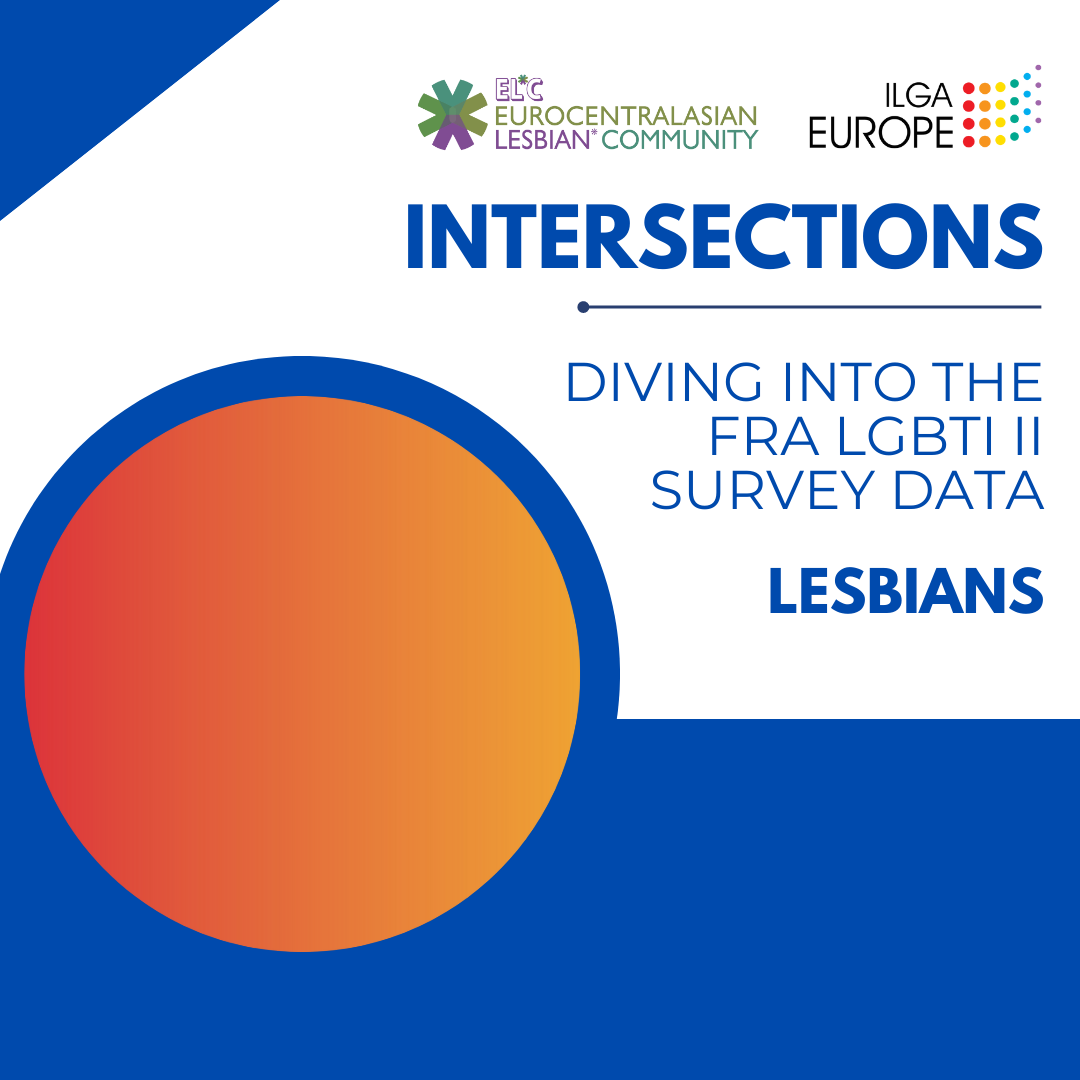
Disaggregated data, which can look deeply into the lived experiences of marginalised people, is a key demand of LGBTI and other human rights groups. With this in mind, over the last year ILGA-Europe have been partnering with a variety of NGOs in the region to analyse the FRA 2019 LGBTI Survey II data and pull out experiences of those experiencing intersectional marginalisation. This work is based on analysis co-commissioned by ILGA-Europe and TGEU.
Over the coming months, watch this space for in-depth briefings on youth, intersex people, religious and ethnic minorities, older LGBTI people, trans people, and others.
This, our briefing on Lesbians was carried out alongside the EuroCentralAsian Lesbian Community EL*C.
#BiVisibilityDay 2022: Discrimination and bi people at the intersections
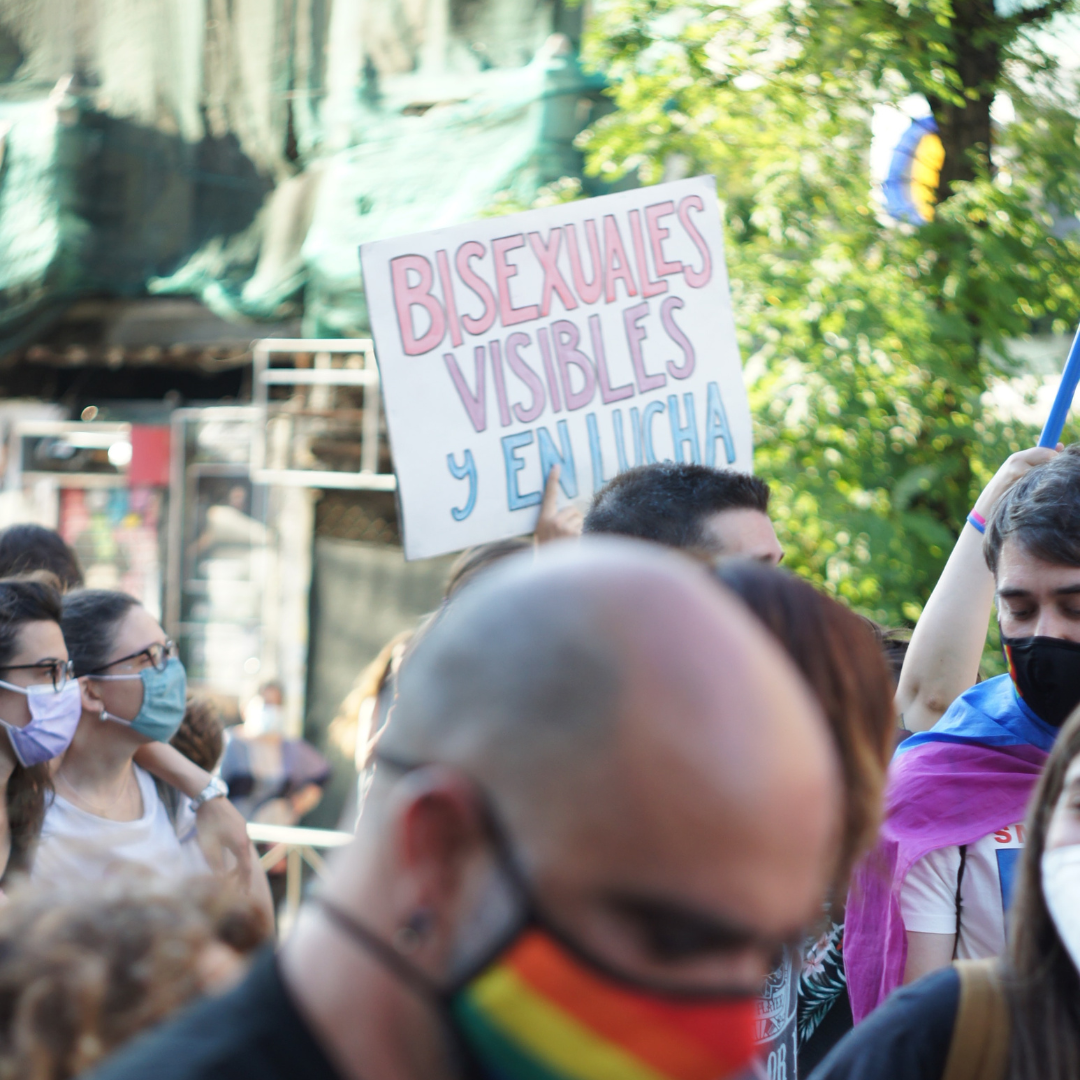
In our analysis of the data from the largest LGBTI survey carried in Europe, we’ve found that bi people, particularly those with intersecting identities, experience discrimination in large numbers.
It’s Bi Visibility Day, an opportunity to celebrate bi people, communities and history. However, while we celebrate, it can’t be ignored that bi people are still subject to unique discrimination rooted in damaging myths that have a damaging impact on individual lives, and particularly for those on the intersections. For bi people to enjoy full equality in our societies, we must acknowledge the discrimination they suffer, especially those who are also part of an ethnic minority, who are trans, or non-binary or who have a disability.
The 2019 EU Agency for Fundamental Rights (FRA) survey on LGBTI people in the EU and North Macedonia and Serbia found that bi people are exposed to discrimination at similar levels as other LGBTI people. With almost 140,000 participants, the FRA survey is the largest of its kind. It shows, for instance, that when looking for work or going to a shop, less bi respondents have experienced discrimination compared to LGBTI people overall, but at school bi people experience more discrimination than the average LGBTI person (20.26% of bi respondents versus 19.51% of LGBTI respondents).
However, it’s when it comes to bi people with intersecting identities that the biggest disparities are found. ILGA-Europe has drilled down into the FRA survey to analyse the experiences of bi people on the intersections. Here are some of the findings from our analysis.
The survey shows that while 19.22% of bi respondents experienced discrimination at work, this figure is over double for trans bi people of an ethnic minority, including migrant background, at 42.98%. The same goes for 27.32% of bi people with disabilities, 34.43% of trans bi people, 31.12% of non-binary bi people, and 25.62% of intersex bi people.
The bi experience of discrimination at work:
- Bi respondents overall: 19.22%
- Intersex bi people: 25.62%
- Bi people with disabilities: 27.32%
- Non-binary bi people: 31.12%
- Trans bi people: 34.43%
- Trans bi people of an ethnic minority*: 42.98%
Another stark example is health care or social services. While almost 15% of the overall bi respondent group experienced discrimination when accessing healthcare or social services, when it came to intersex bi people the figure was almost 50%. Meanwhile 43.56% of trans bi people of an ethnic minority and/or migrant background experienced similar discrimination, 34.86% of trans bi people, 29.77% of bi people with disabilities, 24.15% of non-binary bi people, and 17.79% of bi people of an ethnic minority.
Bi experience of discrimination when accessing health care or social services:
- Bi respondents overall: 14.72%
- Bi people of an ethnic minority: 17.79%
- Non-binary bi people: 24.15%
- Bi people with disabilities: 29.77%
- Trans bi people: 34.86%
- Trans bi people of an ethnic minority: 43.56%
- Intersex bi people: 43.72%
And that’s not all. Over 40% of respondents have felt discriminated when doing the following activities:
- 47.65% of bi trans female respondents have felt discriminated when looking for work.
- 42.98% of trans bi respondents of an ethnic minority have felt discriminated against at work.
- Between 40 and 44% of bi intersex, trans and trans respondents of an ethnic minority* have felt discriminated against when accessing healthcare or social services.
- Over 42% of bi trans male respondents and bi trans respondents of an ethnic minority have felt discriminated against at school.
- 40.36% of bi trans male respondents have felt discriminated against when showing their ID.
These figures are a stark reminder not only that bi people are often at risk of discrimination, but that this risk increases for certain members of the bi community.
ILGA-Europe will be publishing a full report based on our analysis for bi people from the FRA report later this year.
*Ethnic minority always includes migrant background